Hospitality Consumer Behaviour and Insight
VerifiedAdded on 2022/12/27
|20
|6793
|1
AI Summary
This document explores the factors that influence consumer behaviour and attitudes in the hospitality industry. It also discusses the impact of digital technology on customer trends and examines the stages of the consumer decision-making journey. The document further compares the B2B and B2C decision-making processes and evaluates different approaches to market research. Finally, it explores how marketers can influence the different stages of the hospitality decision-making process.
Contribute Materials
Your contribution can guide someone’s learning journey. Share your
documents today.
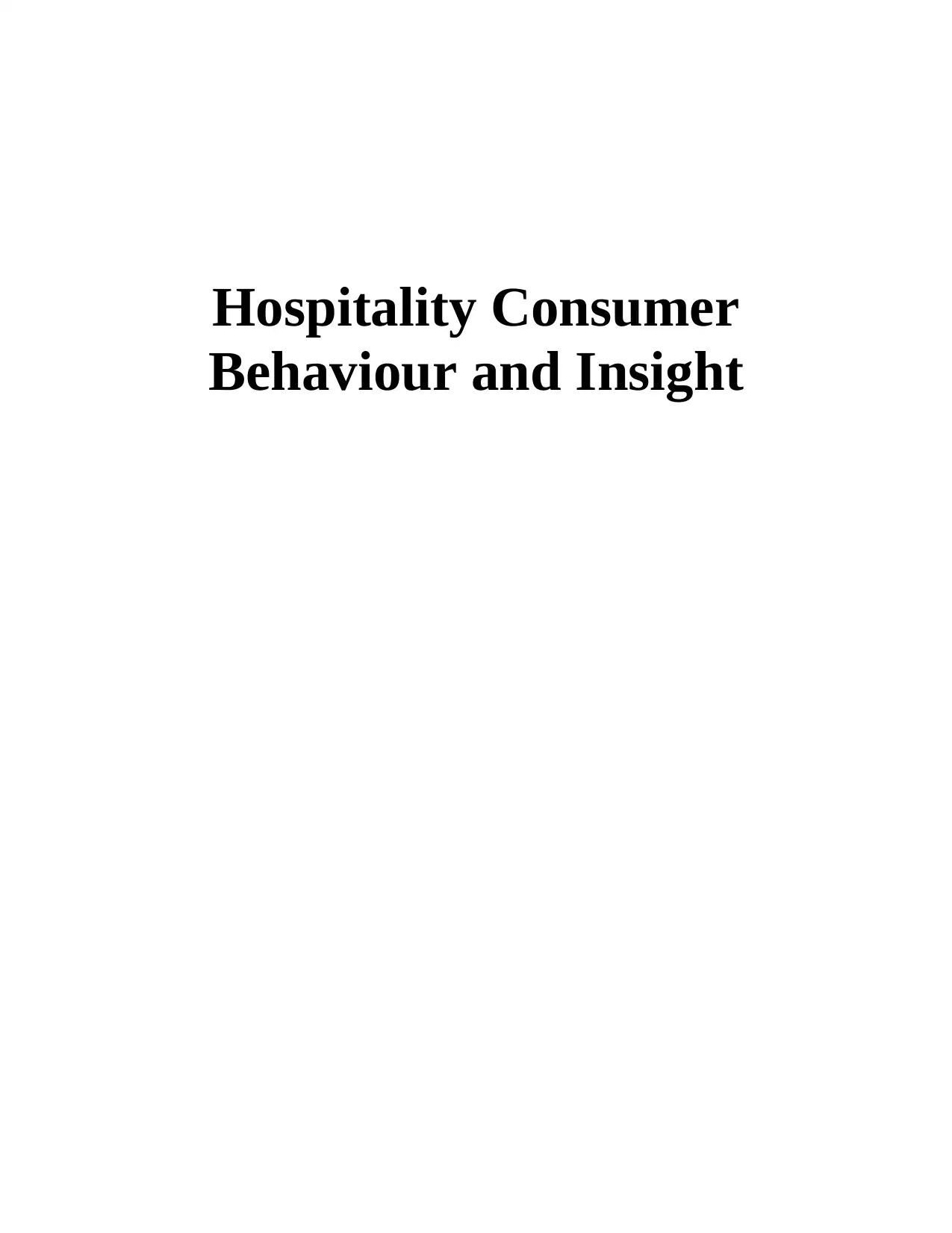
Hospitality Consumer
Behaviour and Insight
Behaviour and Insight
Secure Best Marks with AI Grader
Need help grading? Try our AI Grader for instant feedback on your assignments.
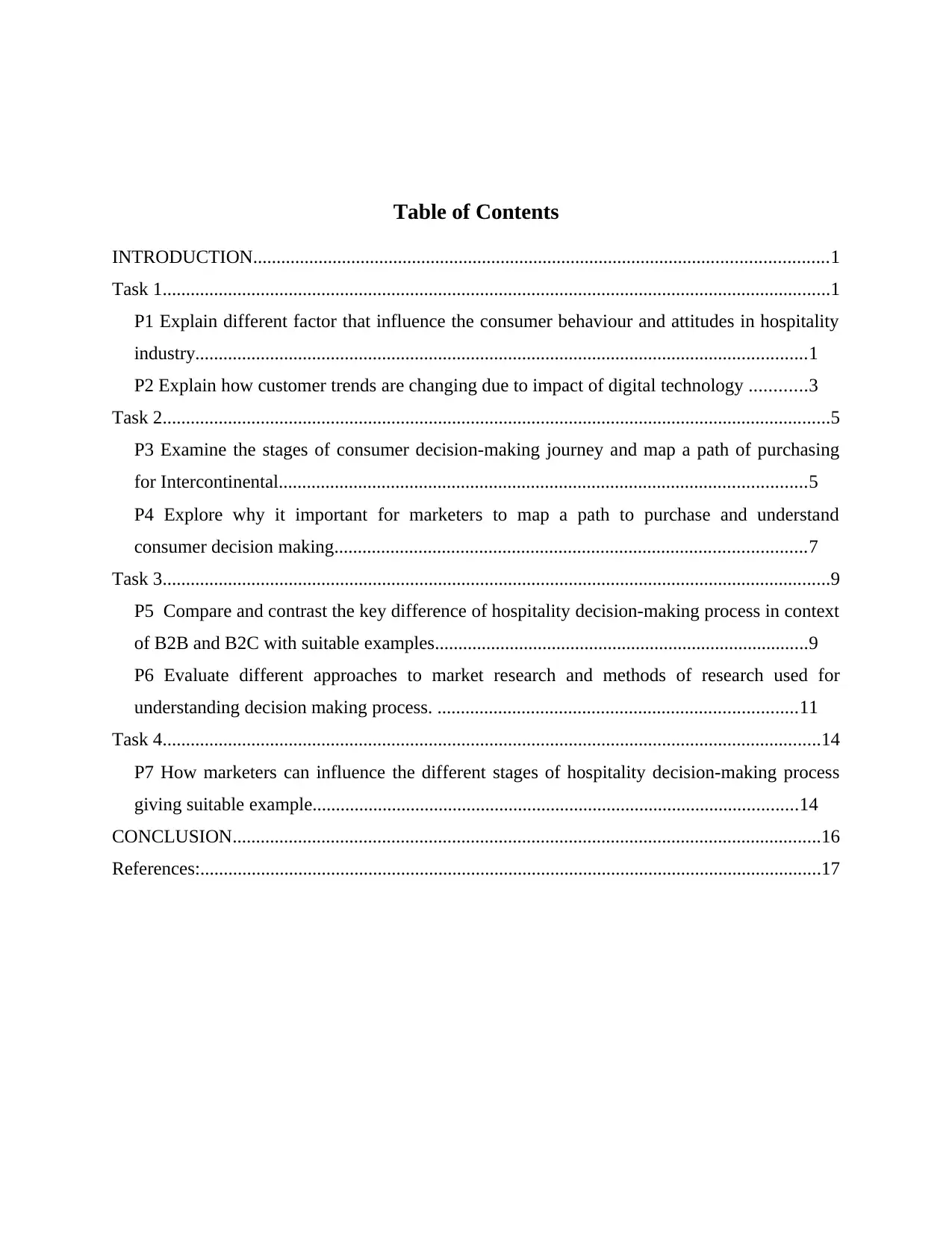
Table of Contents
INTRODUCTION...........................................................................................................................1
Task 1...............................................................................................................................................1
P1 Explain different factor that influence the consumer behaviour and attitudes in hospitality
industry...................................................................................................................................1
P2 Explain how customer trends are changing due to impact of digital technology ............3
Task 2...............................................................................................................................................5
P3 Examine the stages of consumer decision-making journey and map a path of purchasing
for Intercontinental.................................................................................................................5
P4 Explore why it important for marketers to map a path to purchase and understand
consumer decision making.....................................................................................................7
Task 3...............................................................................................................................................9
P5 Compare and contrast the key difference of hospitality decision-making process in context
of B2B and B2C with suitable examples................................................................................9
P6 Evaluate different approaches to market research and methods of research used for
understanding decision making process. .............................................................................11
Task 4.............................................................................................................................................14
P7 How marketers can influence the different stages of hospitality decision-making process
giving suitable example........................................................................................................14
CONCLUSION..............................................................................................................................16
References:.....................................................................................................................................17
INTRODUCTION...........................................................................................................................1
Task 1...............................................................................................................................................1
P1 Explain different factor that influence the consumer behaviour and attitudes in hospitality
industry...................................................................................................................................1
P2 Explain how customer trends are changing due to impact of digital technology ............3
Task 2...............................................................................................................................................5
P3 Examine the stages of consumer decision-making journey and map a path of purchasing
for Intercontinental.................................................................................................................5
P4 Explore why it important for marketers to map a path to purchase and understand
consumer decision making.....................................................................................................7
Task 3...............................................................................................................................................9
P5 Compare and contrast the key difference of hospitality decision-making process in context
of B2B and B2C with suitable examples................................................................................9
P6 Evaluate different approaches to market research and methods of research used for
understanding decision making process. .............................................................................11
Task 4.............................................................................................................................................14
P7 How marketers can influence the different stages of hospitality decision-making process
giving suitable example........................................................................................................14
CONCLUSION..............................................................................................................................16
References:.....................................................................................................................................17
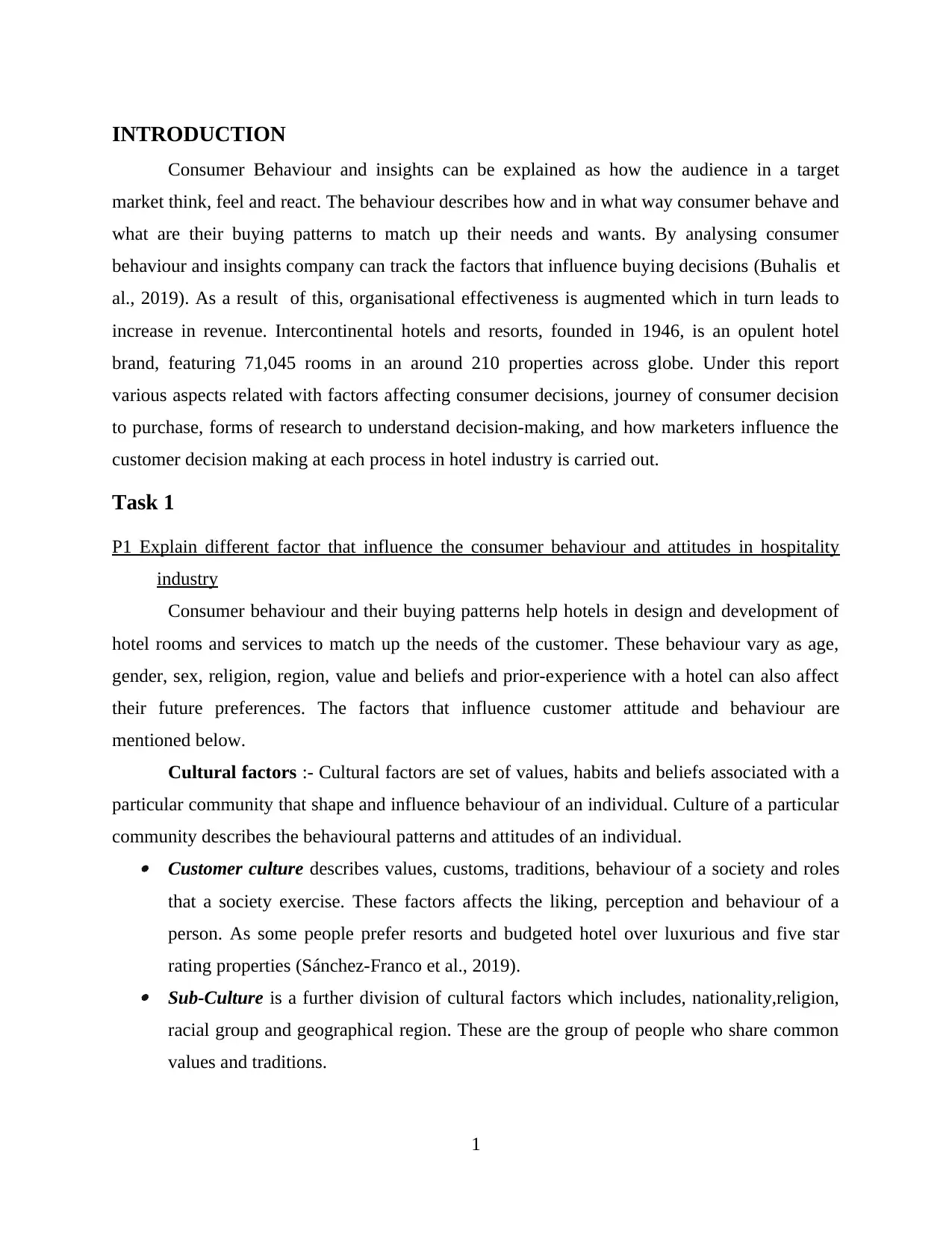
INTRODUCTION
Consumer Behaviour and insights can be explained as how the audience in a target
market think, feel and react. The behaviour describes how and in what way consumer behave and
what are their buying patterns to match up their needs and wants. By analysing consumer
behaviour and insights company can track the factors that influence buying decisions (Buhalis et
al., 2019). As a result of this, organisational effectiveness is augmented which in turn leads to
increase in revenue. Intercontinental hotels and resorts, founded in 1946, is an opulent hotel
brand, featuring 71,045 rooms in an around 210 properties across globe. Under this report
various aspects related with factors affecting consumer decisions, journey of consumer decision
to purchase, forms of research to understand decision-making, and how marketers influence the
customer decision making at each process in hotel industry is carried out.
Task 1
P1 Explain different factor that influence the consumer behaviour and attitudes in hospitality
industry
Consumer behaviour and their buying patterns help hotels in design and development of
hotel rooms and services to match up the needs of the customer. These behaviour vary as age,
gender, sex, religion, region, value and beliefs and prior-experience with a hotel can also affect
their future preferences. The factors that influence customer attitude and behaviour are
mentioned below.
Cultural factors :- Cultural factors are set of values, habits and beliefs associated with a
particular community that shape and influence behaviour of an individual. Culture of a particular
community describes the behavioural patterns and attitudes of an individual. Customer culture describes values, customs, traditions, behaviour of a society and roles
that a society exercise. These factors affects the liking, perception and behaviour of a
person. As some people prefer resorts and budgeted hotel over luxurious and five star
rating properties (Sánchez-Franco et al., 2019). Sub-Culture is a further division of cultural factors which includes, nationality,religion,
racial group and geographical region. These are the group of people who share common
values and traditions.
1
Consumer Behaviour and insights can be explained as how the audience in a target
market think, feel and react. The behaviour describes how and in what way consumer behave and
what are their buying patterns to match up their needs and wants. By analysing consumer
behaviour and insights company can track the factors that influence buying decisions (Buhalis et
al., 2019). As a result of this, organisational effectiveness is augmented which in turn leads to
increase in revenue. Intercontinental hotels and resorts, founded in 1946, is an opulent hotel
brand, featuring 71,045 rooms in an around 210 properties across globe. Under this report
various aspects related with factors affecting consumer decisions, journey of consumer decision
to purchase, forms of research to understand decision-making, and how marketers influence the
customer decision making at each process in hotel industry is carried out.
Task 1
P1 Explain different factor that influence the consumer behaviour and attitudes in hospitality
industry
Consumer behaviour and their buying patterns help hotels in design and development of
hotel rooms and services to match up the needs of the customer. These behaviour vary as age,
gender, sex, religion, region, value and beliefs and prior-experience with a hotel can also affect
their future preferences. The factors that influence customer attitude and behaviour are
mentioned below.
Cultural factors :- Cultural factors are set of values, habits and beliefs associated with a
particular community that shape and influence behaviour of an individual. Culture of a particular
community describes the behavioural patterns and attitudes of an individual. Customer culture describes values, customs, traditions, behaviour of a society and roles
that a society exercise. These factors affects the liking, perception and behaviour of a
person. As some people prefer resorts and budgeted hotel over luxurious and five star
rating properties (Sánchez-Franco et al., 2019). Sub-Culture is a further division of cultural factors which includes, nationality,religion,
racial group and geographical region. These are the group of people who share common
values and traditions.
1
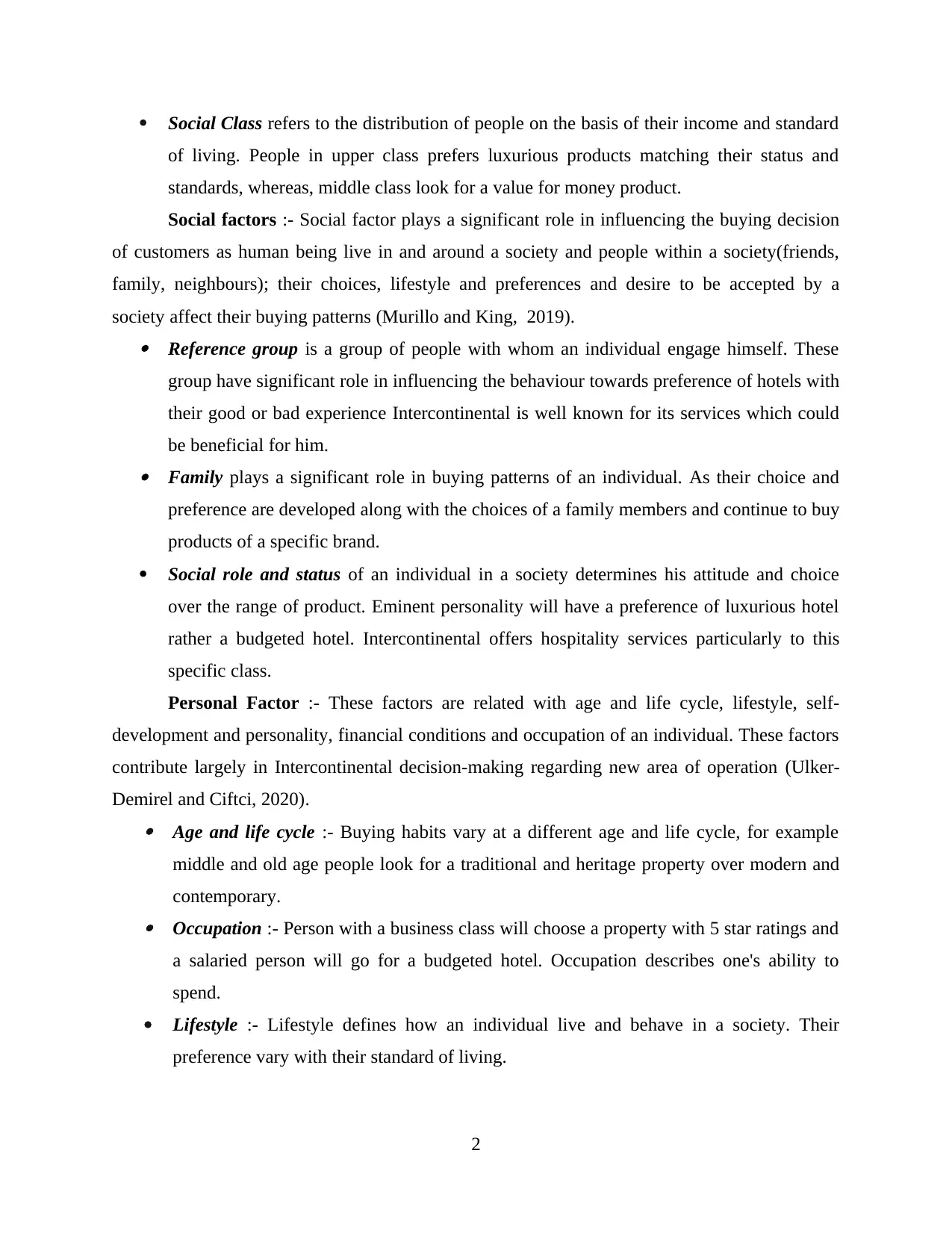
Social Class refers to the distribution of people on the basis of their income and standard
of living. People in upper class prefers luxurious products matching their status and
standards, whereas, middle class look for a value for money product.
Social factors :- Social factor plays a significant role in influencing the buying decision
of customers as human being live in and around a society and people within a society(friends,
family, neighbours); their choices, lifestyle and preferences and desire to be accepted by a
society affect their buying patterns (Murillo and King, 2019). Reference group is a group of people with whom an individual engage himself. These
group have significant role in influencing the behaviour towards preference of hotels with
their good or bad experience Intercontinental is well known for its services which could
be beneficial for him. Family plays a significant role in buying patterns of an individual. As their choice and
preference are developed along with the choices of a family members and continue to buy
products of a specific brand.
Social role and status of an individual in a society determines his attitude and choice
over the range of product. Eminent personality will have a preference of luxurious hotel
rather a budgeted hotel. Intercontinental offers hospitality services particularly to this
specific class.
Personal Factor :- These factors are related with age and life cycle, lifestyle, self-
development and personality, financial conditions and occupation of an individual. These factors
contribute largely in Intercontinental decision-making regarding new area of operation (Ulker-
Demirel and Ciftci, 2020). Age and life cycle :- Buying habits vary at a different age and life cycle, for example
middle and old age people look for a traditional and heritage property over modern and
contemporary. Occupation :- Person with a business class will choose a property with 5 star ratings and
a salaried person will go for a budgeted hotel. Occupation describes one's ability to
spend.
Lifestyle :- Lifestyle defines how an individual live and behave in a society. Their
preference vary with their standard of living.
2
of living. People in upper class prefers luxurious products matching their status and
standards, whereas, middle class look for a value for money product.
Social factors :- Social factor plays a significant role in influencing the buying decision
of customers as human being live in and around a society and people within a society(friends,
family, neighbours); their choices, lifestyle and preferences and desire to be accepted by a
society affect their buying patterns (Murillo and King, 2019). Reference group is a group of people with whom an individual engage himself. These
group have significant role in influencing the behaviour towards preference of hotels with
their good or bad experience Intercontinental is well known for its services which could
be beneficial for him. Family plays a significant role in buying patterns of an individual. As their choice and
preference are developed along with the choices of a family members and continue to buy
products of a specific brand.
Social role and status of an individual in a society determines his attitude and choice
over the range of product. Eminent personality will have a preference of luxurious hotel
rather a budgeted hotel. Intercontinental offers hospitality services particularly to this
specific class.
Personal Factor :- These factors are related with age and life cycle, lifestyle, self-
development and personality, financial conditions and occupation of an individual. These factors
contribute largely in Intercontinental decision-making regarding new area of operation (Ulker-
Demirel and Ciftci, 2020). Age and life cycle :- Buying habits vary at a different age and life cycle, for example
middle and old age people look for a traditional and heritage property over modern and
contemporary. Occupation :- Person with a business class will choose a property with 5 star ratings and
a salaried person will go for a budgeted hotel. Occupation describes one's ability to
spend.
Lifestyle :- Lifestyle defines how an individual live and behave in a society. Their
preference vary with their standard of living.
2
Secure Best Marks with AI Grader
Need help grading? Try our AI Grader for instant feedback on your assignments.
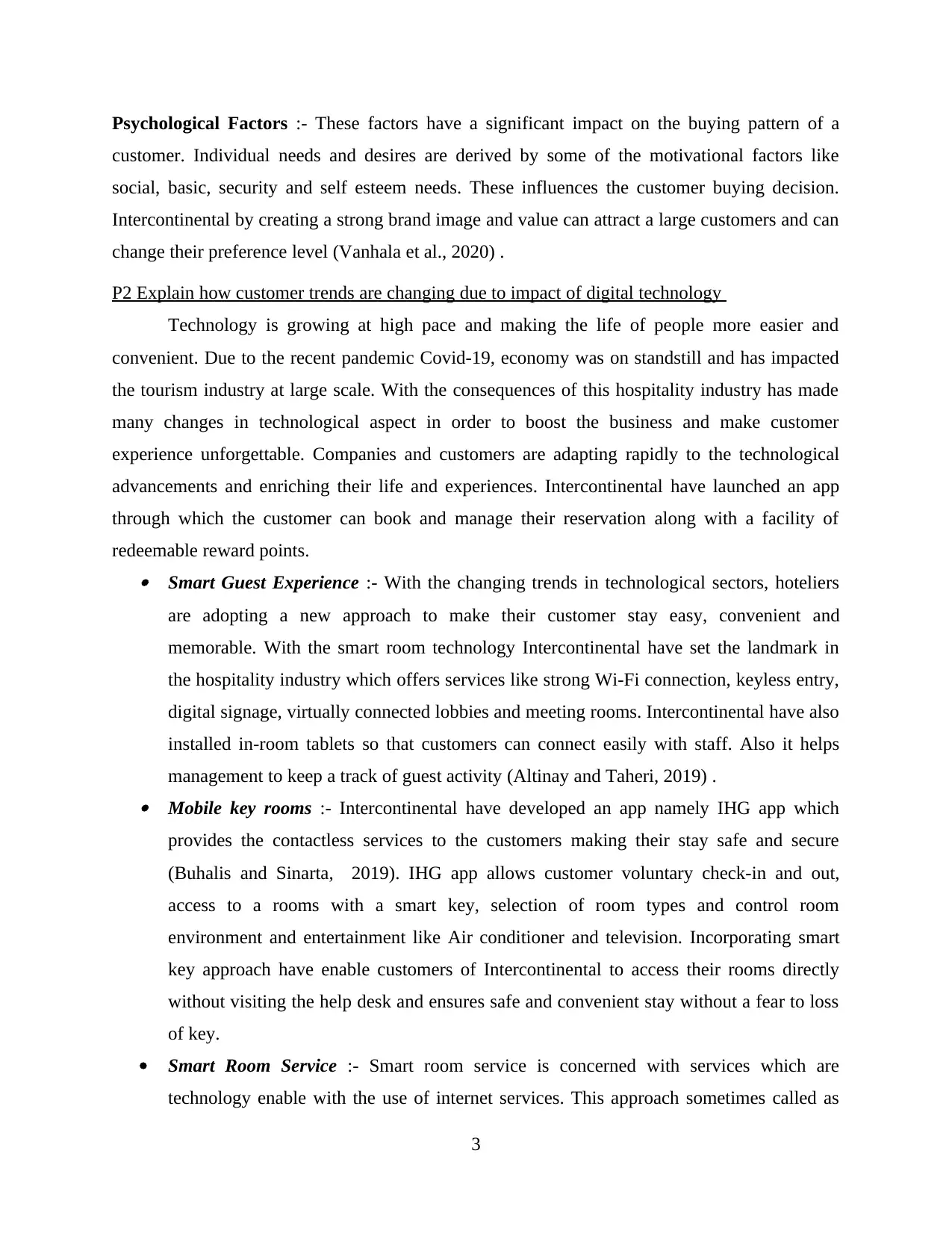
Psychological Factors :- These factors have a significant impact on the buying pattern of a
customer. Individual needs and desires are derived by some of the motivational factors like
social, basic, security and self esteem needs. These influences the customer buying decision.
Intercontinental by creating a strong brand image and value can attract a large customers and can
change their preference level (Vanhala et al., 2020) .
P2 Explain how customer trends are changing due to impact of digital technology
Technology is growing at high pace and making the life of people more easier and
convenient. Due to the recent pandemic Covid-19, economy was on standstill and has impacted
the tourism industry at large scale. With the consequences of this hospitality industry has made
many changes in technological aspect in order to boost the business and make customer
experience unforgettable. Companies and customers are adapting rapidly to the technological
advancements and enriching their life and experiences. Intercontinental have launched an app
through which the customer can book and manage their reservation along with a facility of
redeemable reward points. Smart Guest Experience :- With the changing trends in technological sectors, hoteliers
are adopting a new approach to make their customer stay easy, convenient and
memorable. With the smart room technology Intercontinental have set the landmark in
the hospitality industry which offers services like strong Wi-Fi connection, keyless entry,
digital signage, virtually connected lobbies and meeting rooms. Intercontinental have also
installed in-room tablets so that customers can connect easily with staff. Also it helps
management to keep a track of guest activity (Altinay and Taheri, 2019) . Mobile key rooms :- Intercontinental have developed an app namely IHG app which
provides the contactless services to the customers making their stay safe and secure
(Buhalis and Sinarta, 2019). IHG app allows customer voluntary check-in and out,
access to a rooms with a smart key, selection of room types and control room
environment and entertainment like Air conditioner and television. Incorporating smart
key approach have enable customers of Intercontinental to access their rooms directly
without visiting the help desk and ensures safe and convenient stay without a fear to loss
of key.
Smart Room Service :- Smart room service is concerned with services which are
technology enable with the use of internet services. This approach sometimes called as
3
customer. Individual needs and desires are derived by some of the motivational factors like
social, basic, security and self esteem needs. These influences the customer buying decision.
Intercontinental by creating a strong brand image and value can attract a large customers and can
change their preference level (Vanhala et al., 2020) .
P2 Explain how customer trends are changing due to impact of digital technology
Technology is growing at high pace and making the life of people more easier and
convenient. Due to the recent pandemic Covid-19, economy was on standstill and has impacted
the tourism industry at large scale. With the consequences of this hospitality industry has made
many changes in technological aspect in order to boost the business and make customer
experience unforgettable. Companies and customers are adapting rapidly to the technological
advancements and enriching their life and experiences. Intercontinental have launched an app
through which the customer can book and manage their reservation along with a facility of
redeemable reward points. Smart Guest Experience :- With the changing trends in technological sectors, hoteliers
are adopting a new approach to make their customer stay easy, convenient and
memorable. With the smart room technology Intercontinental have set the landmark in
the hospitality industry which offers services like strong Wi-Fi connection, keyless entry,
digital signage, virtually connected lobbies and meeting rooms. Intercontinental have also
installed in-room tablets so that customers can connect easily with staff. Also it helps
management to keep a track of guest activity (Altinay and Taheri, 2019) . Mobile key rooms :- Intercontinental have developed an app namely IHG app which
provides the contactless services to the customers making their stay safe and secure
(Buhalis and Sinarta, 2019). IHG app allows customer voluntary check-in and out,
access to a rooms with a smart key, selection of room types and control room
environment and entertainment like Air conditioner and television. Incorporating smart
key approach have enable customers of Intercontinental to access their rooms directly
without visiting the help desk and ensures safe and convenient stay without a fear to loss
of key.
Smart Room Service :- Smart room service is concerned with services which are
technology enable with the use of internet services. This approach sometimes called as
3
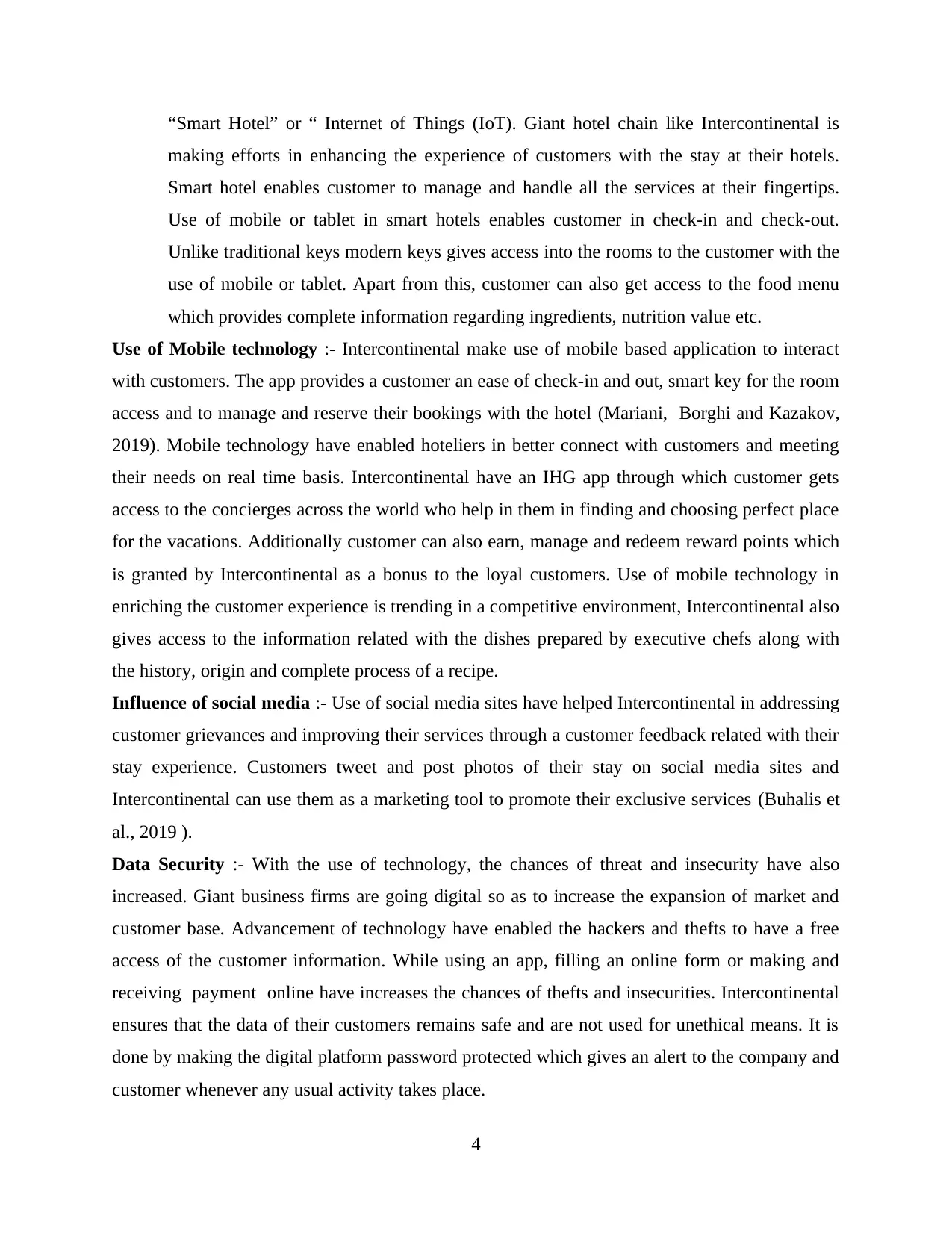
“Smart Hotel” or “ Internet of Things (IoT). Giant hotel chain like Intercontinental is
making efforts in enhancing the experience of customers with the stay at their hotels.
Smart hotel enables customer to manage and handle all the services at their fingertips.
Use of mobile or tablet in smart hotels enables customer in check-in and check-out.
Unlike traditional keys modern keys gives access into the rooms to the customer with the
use of mobile or tablet. Apart from this, customer can also get access to the food menu
which provides complete information regarding ingredients, nutrition value etc.
Use of Mobile technology :- Intercontinental make use of mobile based application to interact
with customers. The app provides a customer an ease of check-in and out, smart key for the room
access and to manage and reserve their bookings with the hotel (Mariani, Borghi and Kazakov,
2019). Mobile technology have enabled hoteliers in better connect with customers and meeting
their needs on real time basis. Intercontinental have an IHG app through which customer gets
access to the concierges across the world who help in them in finding and choosing perfect place
for the vacations. Additionally customer can also earn, manage and redeem reward points which
is granted by Intercontinental as a bonus to the loyal customers. Use of mobile technology in
enriching the customer experience is trending in a competitive environment, Intercontinental also
gives access to the information related with the dishes prepared by executive chefs along with
the history, origin and complete process of a recipe.
Influence of social media :- Use of social media sites have helped Intercontinental in addressing
customer grievances and improving their services through a customer feedback related with their
stay experience. Customers tweet and post photos of their stay on social media sites and
Intercontinental can use them as a marketing tool to promote their exclusive services (Buhalis et
al., 2019 ).
Data Security :- With the use of technology, the chances of threat and insecurity have also
increased. Giant business firms are going digital so as to increase the expansion of market and
customer base. Advancement of technology have enabled the hackers and thefts to have a free
access of the customer information. While using an app, filling an online form or making and
receiving payment online have increases the chances of thefts and insecurities. Intercontinental
ensures that the data of their customers remains safe and are not used for unethical means. It is
done by making the digital platform password protected which gives an alert to the company and
customer whenever any usual activity takes place.
4
making efforts in enhancing the experience of customers with the stay at their hotels.
Smart hotel enables customer to manage and handle all the services at their fingertips.
Use of mobile or tablet in smart hotels enables customer in check-in and check-out.
Unlike traditional keys modern keys gives access into the rooms to the customer with the
use of mobile or tablet. Apart from this, customer can also get access to the food menu
which provides complete information regarding ingredients, nutrition value etc.
Use of Mobile technology :- Intercontinental make use of mobile based application to interact
with customers. The app provides a customer an ease of check-in and out, smart key for the room
access and to manage and reserve their bookings with the hotel (Mariani, Borghi and Kazakov,
2019). Mobile technology have enabled hoteliers in better connect with customers and meeting
their needs on real time basis. Intercontinental have an IHG app through which customer gets
access to the concierges across the world who help in them in finding and choosing perfect place
for the vacations. Additionally customer can also earn, manage and redeem reward points which
is granted by Intercontinental as a bonus to the loyal customers. Use of mobile technology in
enriching the customer experience is trending in a competitive environment, Intercontinental also
gives access to the information related with the dishes prepared by executive chefs along with
the history, origin and complete process of a recipe.
Influence of social media :- Use of social media sites have helped Intercontinental in addressing
customer grievances and improving their services through a customer feedback related with their
stay experience. Customers tweet and post photos of their stay on social media sites and
Intercontinental can use them as a marketing tool to promote their exclusive services (Buhalis et
al., 2019 ).
Data Security :- With the use of technology, the chances of threat and insecurity have also
increased. Giant business firms are going digital so as to increase the expansion of market and
customer base. Advancement of technology have enabled the hackers and thefts to have a free
access of the customer information. While using an app, filling an online form or making and
receiving payment online have increases the chances of thefts and insecurities. Intercontinental
ensures that the data of their customers remains safe and are not used for unethical means. It is
done by making the digital platform password protected which gives an alert to the company and
customer whenever any usual activity takes place.
4
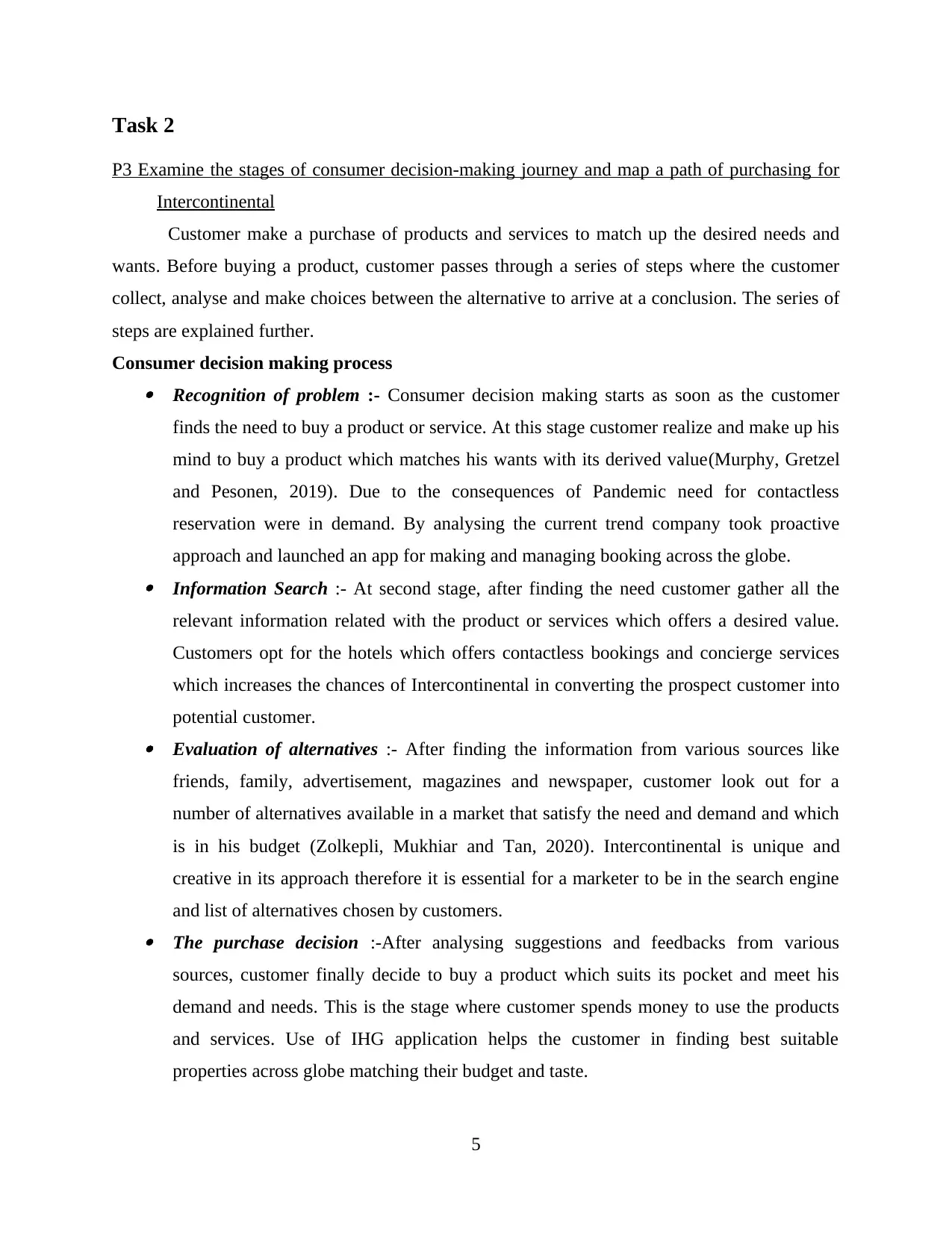
Task 2
P3 Examine the stages of consumer decision-making journey and map a path of purchasing for
Intercontinental
Customer make a purchase of products and services to match up the desired needs and
wants. Before buying a product, customer passes through a series of steps where the customer
collect, analyse and make choices between the alternative to arrive at a conclusion. The series of
steps are explained further.
Consumer decision making process Recognition of problem :- Consumer decision making starts as soon as the customer
finds the need to buy a product or service. At this stage customer realize and make up his
mind to buy a product which matches his wants with its derived value(Murphy, Gretzel
and Pesonen, 2019). Due to the consequences of Pandemic need for contactless
reservation were in demand. By analysing the current trend company took proactive
approach and launched an app for making and managing booking across the globe. Information Search :- At second stage, after finding the need customer gather all the
relevant information related with the product or services which offers a desired value.
Customers opt for the hotels which offers contactless bookings and concierge services
which increases the chances of Intercontinental in converting the prospect customer into
potential customer. Evaluation of alternatives :- After finding the information from various sources like
friends, family, advertisement, magazines and newspaper, customer look out for a
number of alternatives available in a market that satisfy the need and demand and which
is in his budget (Zolkepli, Mukhiar and Tan, 2020). Intercontinental is unique and
creative in its approach therefore it is essential for a marketer to be in the search engine
and list of alternatives chosen by customers. The purchase decision :-After analysing suggestions and feedbacks from various
sources, customer finally decide to buy a product which suits its pocket and meet his
demand and needs. This is the stage where customer spends money to use the products
and services. Use of IHG application helps the customer in finding best suitable
properties across globe matching their budget and taste.
5
P3 Examine the stages of consumer decision-making journey and map a path of purchasing for
Intercontinental
Customer make a purchase of products and services to match up the desired needs and
wants. Before buying a product, customer passes through a series of steps where the customer
collect, analyse and make choices between the alternative to arrive at a conclusion. The series of
steps are explained further.
Consumer decision making process Recognition of problem :- Consumer decision making starts as soon as the customer
finds the need to buy a product or service. At this stage customer realize and make up his
mind to buy a product which matches his wants with its derived value(Murphy, Gretzel
and Pesonen, 2019). Due to the consequences of Pandemic need for contactless
reservation were in demand. By analysing the current trend company took proactive
approach and launched an app for making and managing booking across the globe. Information Search :- At second stage, after finding the need customer gather all the
relevant information related with the product or services which offers a desired value.
Customers opt for the hotels which offers contactless bookings and concierge services
which increases the chances of Intercontinental in converting the prospect customer into
potential customer. Evaluation of alternatives :- After finding the information from various sources like
friends, family, advertisement, magazines and newspaper, customer look out for a
number of alternatives available in a market that satisfy the need and demand and which
is in his budget (Zolkepli, Mukhiar and Tan, 2020). Intercontinental is unique and
creative in its approach therefore it is essential for a marketer to be in the search engine
and list of alternatives chosen by customers. The purchase decision :-After analysing suggestions and feedbacks from various
sources, customer finally decide to buy a product which suits its pocket and meet his
demand and needs. This is the stage where customer spends money to use the products
and services. Use of IHG application helps the customer in finding best suitable
properties across globe matching their budget and taste.
5
Paraphrase This Document
Need a fresh take? Get an instant paraphrase of this document with our AI Paraphraser
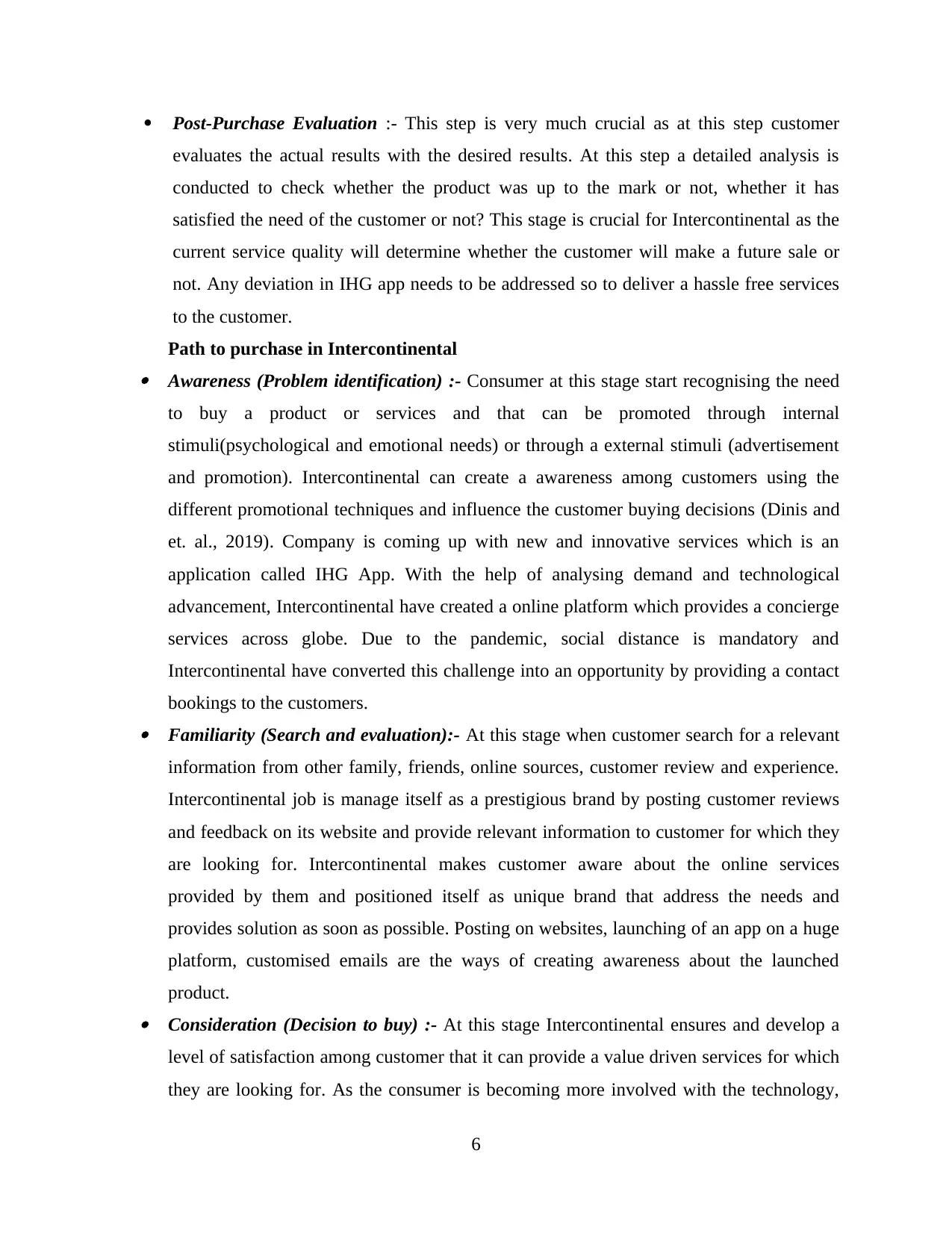
Post-Purchase Evaluation :- This step is very much crucial as at this step customer
evaluates the actual results with the desired results. At this step a detailed analysis is
conducted to check whether the product was up to the mark or not, whether it has
satisfied the need of the customer or not? This stage is crucial for Intercontinental as the
current service quality will determine whether the customer will make a future sale or
not. Any deviation in IHG app needs to be addressed so to deliver a hassle free services
to the customer.
Path to purchase in Intercontinental Awareness (Problem identification) :- Consumer at this stage start recognising the need
to buy a product or services and that can be promoted through internal
stimuli(psychological and emotional needs) or through a external stimuli (advertisement
and promotion). Intercontinental can create a awareness among customers using the
different promotional techniques and influence the customer buying decisions (Dinis and
et. al., 2019). Company is coming up with new and innovative services which is an
application called IHG App. With the help of analysing demand and technological
advancement, Intercontinental have created a online platform which provides a concierge
services across globe. Due to the pandemic, social distance is mandatory and
Intercontinental have converted this challenge into an opportunity by providing a contact
bookings to the customers. Familiarity (Search and evaluation):- At this stage when customer search for a relevant
information from other family, friends, online sources, customer review and experience.
Intercontinental job is manage itself as a prestigious brand by posting customer reviews
and feedback on its website and provide relevant information to customer for which they
are looking for. Intercontinental makes customer aware about the online services
provided by them and positioned itself as unique brand that address the needs and
provides solution as soon as possible. Posting on websites, launching of an app on a huge
platform, customised emails are the ways of creating awareness about the launched
product. Consideration (Decision to buy) :- At this stage Intercontinental ensures and develop a
level of satisfaction among customer that it can provide a value driven services for which
they are looking for. As the consumer is becoming more involved with the technology,
6
evaluates the actual results with the desired results. At this step a detailed analysis is
conducted to check whether the product was up to the mark or not, whether it has
satisfied the need of the customer or not? This stage is crucial for Intercontinental as the
current service quality will determine whether the customer will make a future sale or
not. Any deviation in IHG app needs to be addressed so to deliver a hassle free services
to the customer.
Path to purchase in Intercontinental Awareness (Problem identification) :- Consumer at this stage start recognising the need
to buy a product or services and that can be promoted through internal
stimuli(psychological and emotional needs) or through a external stimuli (advertisement
and promotion). Intercontinental can create a awareness among customers using the
different promotional techniques and influence the customer buying decisions (Dinis and
et. al., 2019). Company is coming up with new and innovative services which is an
application called IHG App. With the help of analysing demand and technological
advancement, Intercontinental have created a online platform which provides a concierge
services across globe. Due to the pandemic, social distance is mandatory and
Intercontinental have converted this challenge into an opportunity by providing a contact
bookings to the customers. Familiarity (Search and evaluation):- At this stage when customer search for a relevant
information from other family, friends, online sources, customer review and experience.
Intercontinental job is manage itself as a prestigious brand by posting customer reviews
and feedback on its website and provide relevant information to customer for which they
are looking for. Intercontinental makes customer aware about the online services
provided by them and positioned itself as unique brand that address the needs and
provides solution as soon as possible. Posting on websites, launching of an app on a huge
platform, customised emails are the ways of creating awareness about the launched
product. Consideration (Decision to buy) :- At this stage Intercontinental ensures and develop a
level of satisfaction among customer that it can provide a value driven services for which
they are looking for. As the consumer is becoming more involved with the technology,
6
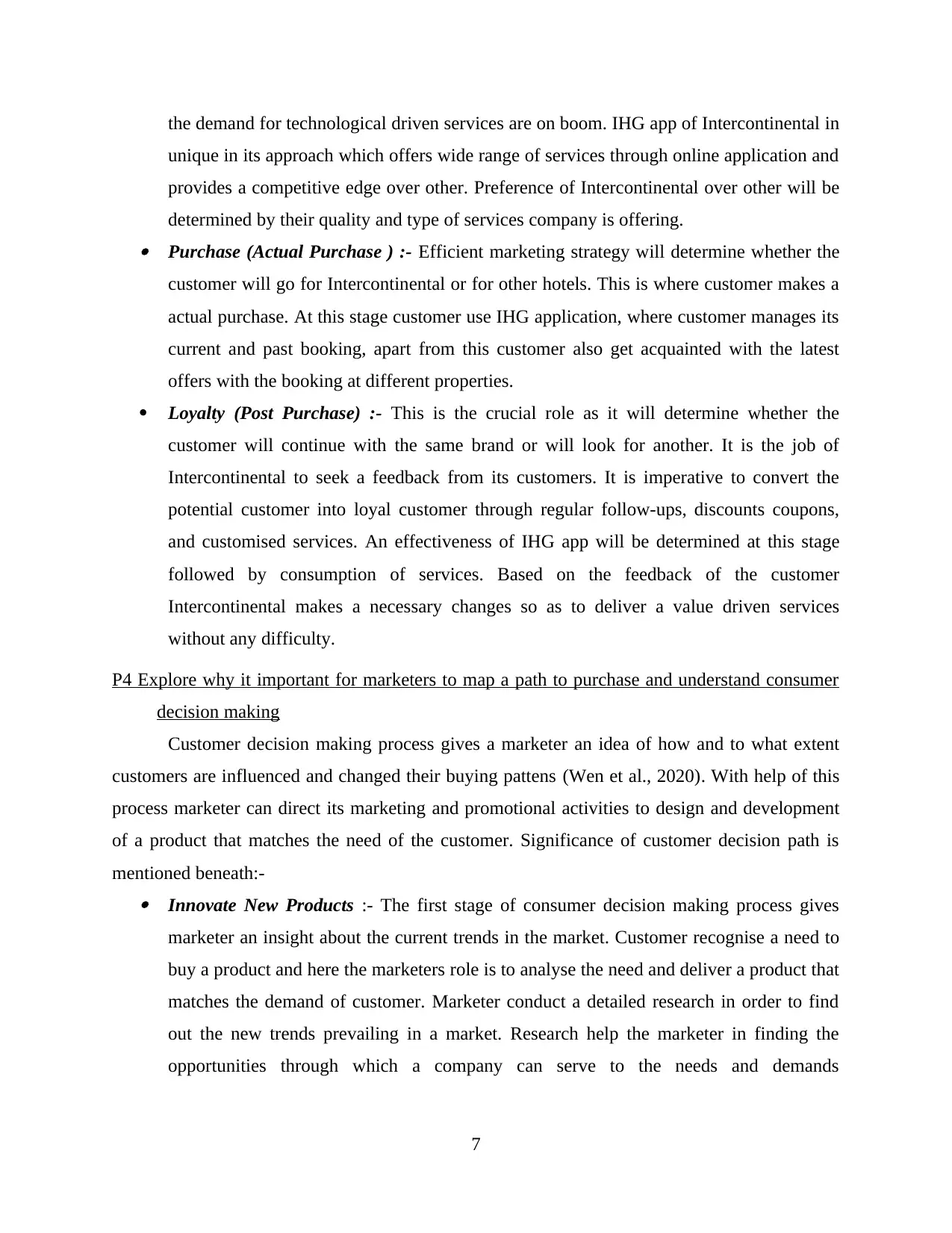
the demand for technological driven services are on boom. IHG app of Intercontinental in
unique in its approach which offers wide range of services through online application and
provides a competitive edge over other. Preference of Intercontinental over other will be
determined by their quality and type of services company is offering. Purchase (Actual Purchase ) :- Efficient marketing strategy will determine whether the
customer will go for Intercontinental or for other hotels. This is where customer makes a
actual purchase. At this stage customer use IHG application, where customer manages its
current and past booking, apart from this customer also get acquainted with the latest
offers with the booking at different properties.
Loyalty (Post Purchase) :- This is the crucial role as it will determine whether the
customer will continue with the same brand or will look for another. It is the job of
Intercontinental to seek a feedback from its customers. It is imperative to convert the
potential customer into loyal customer through regular follow-ups, discounts coupons,
and customised services. An effectiveness of IHG app will be determined at this stage
followed by consumption of services. Based on the feedback of the customer
Intercontinental makes a necessary changes so as to deliver a value driven services
without any difficulty.
P4 Explore why it important for marketers to map a path to purchase and understand consumer
decision making
Customer decision making process gives a marketer an idea of how and to what extent
customers are influenced and changed their buying pattens (Wen et al., 2020). With help of this
process marketer can direct its marketing and promotional activities to design and development
of a product that matches the need of the customer. Significance of customer decision path is
mentioned beneath:- Innovate New Products :- The first stage of consumer decision making process gives
marketer an insight about the current trends in the market. Customer recognise a need to
buy a product and here the marketers role is to analyse the need and deliver a product that
matches the demand of customer. Marketer conduct a detailed research in order to find
out the new trends prevailing in a market. Research help the marketer in finding the
opportunities through which a company can serve to the needs and demands
7
unique in its approach which offers wide range of services through online application and
provides a competitive edge over other. Preference of Intercontinental over other will be
determined by their quality and type of services company is offering. Purchase (Actual Purchase ) :- Efficient marketing strategy will determine whether the
customer will go for Intercontinental or for other hotels. This is where customer makes a
actual purchase. At this stage customer use IHG application, where customer manages its
current and past booking, apart from this customer also get acquainted with the latest
offers with the booking at different properties.
Loyalty (Post Purchase) :- This is the crucial role as it will determine whether the
customer will continue with the same brand or will look for another. It is the job of
Intercontinental to seek a feedback from its customers. It is imperative to convert the
potential customer into loyal customer through regular follow-ups, discounts coupons,
and customised services. An effectiveness of IHG app will be determined at this stage
followed by consumption of services. Based on the feedback of the customer
Intercontinental makes a necessary changes so as to deliver a value driven services
without any difficulty.
P4 Explore why it important for marketers to map a path to purchase and understand consumer
decision making
Customer decision making process gives a marketer an idea of how and to what extent
customers are influenced and changed their buying pattens (Wen et al., 2020). With help of this
process marketer can direct its marketing and promotional activities to design and development
of a product that matches the need of the customer. Significance of customer decision path is
mentioned beneath:- Innovate New Products :- The first stage of consumer decision making process gives
marketer an insight about the current trends in the market. Customer recognise a need to
buy a product and here the marketers role is to analyse the need and deliver a product that
matches the demand of customer. Marketer conduct a detailed research in order to find
out the new trends prevailing in a market. Research help the marketer in finding the
opportunities through which a company can serve to the needs and demands
7
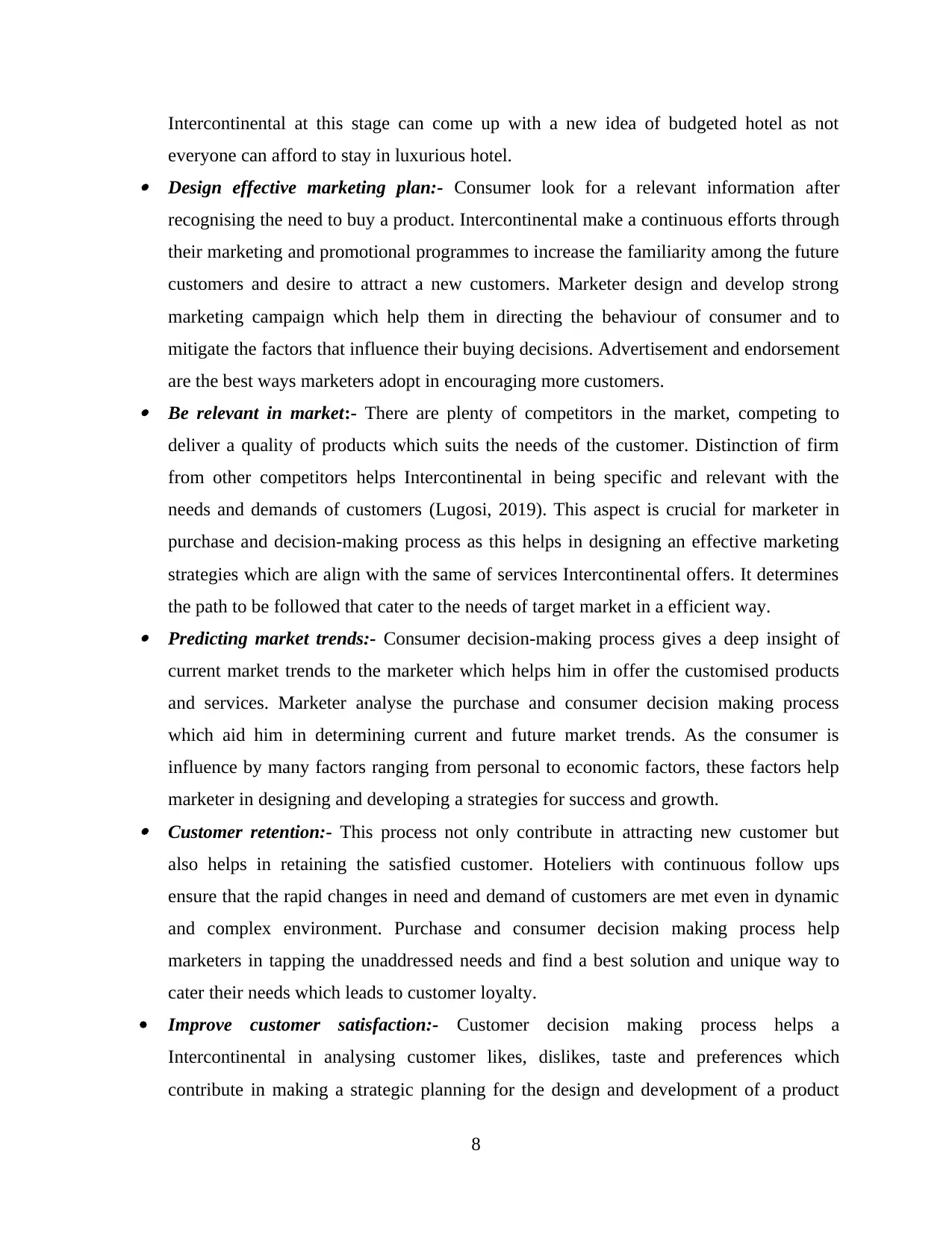
Intercontinental at this stage can come up with a new idea of budgeted hotel as not
everyone can afford to stay in luxurious hotel. Design effective marketing plan:- Consumer look for a relevant information after
recognising the need to buy a product. Intercontinental make a continuous efforts through
their marketing and promotional programmes to increase the familiarity among the future
customers and desire to attract a new customers. Marketer design and develop strong
marketing campaign which help them in directing the behaviour of consumer and to
mitigate the factors that influence their buying decisions. Advertisement and endorsement
are the best ways marketers adopt in encouraging more customers. Be relevant in market:- There are plenty of competitors in the market, competing to
deliver a quality of products which suits the needs of the customer. Distinction of firm
from other competitors helps Intercontinental in being specific and relevant with the
needs and demands of customers (Lugosi, 2019). This aspect is crucial for marketer in
purchase and decision-making process as this helps in designing an effective marketing
strategies which are align with the same of services Intercontinental offers. It determines
the path to be followed that cater to the needs of target market in a efficient way. Predicting market trends:- Consumer decision-making process gives a deep insight of
current market trends to the marketer which helps him in offer the customised products
and services. Marketer analyse the purchase and consumer decision making process
which aid him in determining current and future market trends. As the consumer is
influence by many factors ranging from personal to economic factors, these factors help
marketer in designing and developing a strategies for success and growth. Customer retention:- This process not only contribute in attracting new customer but
also helps in retaining the satisfied customer. Hoteliers with continuous follow ups
ensure that the rapid changes in need and demand of customers are met even in dynamic
and complex environment. Purchase and consumer decision making process help
marketers in tapping the unaddressed needs and find a best solution and unique way to
cater their needs which leads to customer loyalty.
Improve customer satisfaction:- Customer decision making process helps a
Intercontinental in analysing customer likes, dislikes, taste and preferences which
contribute in making a strategic planning for the design and development of a product
8
everyone can afford to stay in luxurious hotel. Design effective marketing plan:- Consumer look for a relevant information after
recognising the need to buy a product. Intercontinental make a continuous efforts through
their marketing and promotional programmes to increase the familiarity among the future
customers and desire to attract a new customers. Marketer design and develop strong
marketing campaign which help them in directing the behaviour of consumer and to
mitigate the factors that influence their buying decisions. Advertisement and endorsement
are the best ways marketers adopt in encouraging more customers. Be relevant in market:- There are plenty of competitors in the market, competing to
deliver a quality of products which suits the needs of the customer. Distinction of firm
from other competitors helps Intercontinental in being specific and relevant with the
needs and demands of customers (Lugosi, 2019). This aspect is crucial for marketer in
purchase and decision-making process as this helps in designing an effective marketing
strategies which are align with the same of services Intercontinental offers. It determines
the path to be followed that cater to the needs of target market in a efficient way. Predicting market trends:- Consumer decision-making process gives a deep insight of
current market trends to the marketer which helps him in offer the customised products
and services. Marketer analyse the purchase and consumer decision making process
which aid him in determining current and future market trends. As the consumer is
influence by many factors ranging from personal to economic factors, these factors help
marketer in designing and developing a strategies for success and growth. Customer retention:- This process not only contribute in attracting new customer but
also helps in retaining the satisfied customer. Hoteliers with continuous follow ups
ensure that the rapid changes in need and demand of customers are met even in dynamic
and complex environment. Purchase and consumer decision making process help
marketers in tapping the unaddressed needs and find a best solution and unique way to
cater their needs which leads to customer loyalty.
Improve customer satisfaction:- Customer decision making process helps a
Intercontinental in analysing customer likes, dislikes, taste and preferences which
contribute in making a strategic planning for the design and development of a product
8
Secure Best Marks with AI Grader
Need help grading? Try our AI Grader for instant feedback on your assignments.
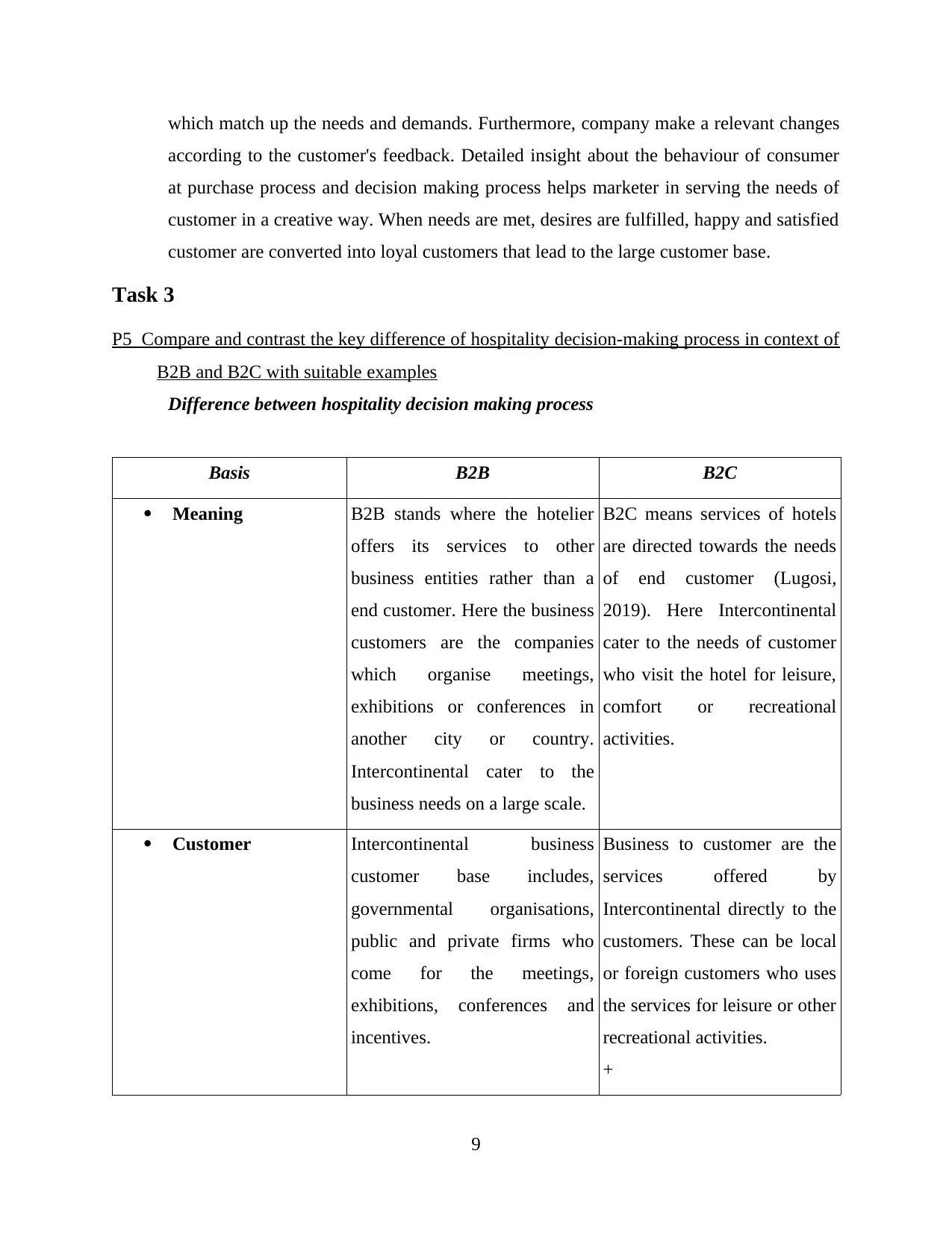
which match up the needs and demands. Furthermore, company make a relevant changes
according to the customer's feedback. Detailed insight about the behaviour of consumer
at purchase process and decision making process helps marketer in serving the needs of
customer in a creative way. When needs are met, desires are fulfilled, happy and satisfied
customer are converted into loyal customers that lead to the large customer base.
Task 3
P5 Compare and contrast the key difference of hospitality decision-making process in context of
B2B and B2C with suitable examples
Difference between hospitality decision making process
Basis B2B B2C
Meaning B2B stands where the hotelier
offers its services to other
business entities rather than a
end customer. Here the business
customers are the companies
which organise meetings,
exhibitions or conferences in
another city or country.
Intercontinental cater to the
business needs on a large scale.
B2C means services of hotels
are directed towards the needs
of end customer (Lugosi,
2019). Here Intercontinental
cater to the needs of customer
who visit the hotel for leisure,
comfort or recreational
activities.
Customer Intercontinental business
customer base includes,
governmental organisations,
public and private firms who
come for the meetings,
exhibitions, conferences and
incentives.
Business to customer are the
services offered by
Intercontinental directly to the
customers. These can be local
or foreign customers who uses
the services for leisure or other
recreational activities.
+
9
according to the customer's feedback. Detailed insight about the behaviour of consumer
at purchase process and decision making process helps marketer in serving the needs of
customer in a creative way. When needs are met, desires are fulfilled, happy and satisfied
customer are converted into loyal customers that lead to the large customer base.
Task 3
P5 Compare and contrast the key difference of hospitality decision-making process in context of
B2B and B2C with suitable examples
Difference between hospitality decision making process
Basis B2B B2C
Meaning B2B stands where the hotelier
offers its services to other
business entities rather than a
end customer. Here the business
customers are the companies
which organise meetings,
exhibitions or conferences in
another city or country.
Intercontinental cater to the
business needs on a large scale.
B2C means services of hotels
are directed towards the needs
of end customer (Lugosi,
2019). Here Intercontinental
cater to the needs of customer
who visit the hotel for leisure,
comfort or recreational
activities.
Customer Intercontinental business
customer base includes,
governmental organisations,
public and private firms who
come for the meetings,
exhibitions, conferences and
incentives.
Business to customer are the
services offered by
Intercontinental directly to the
customers. These can be local
or foreign customers who uses
the services for leisure or other
recreational activities.
+
9
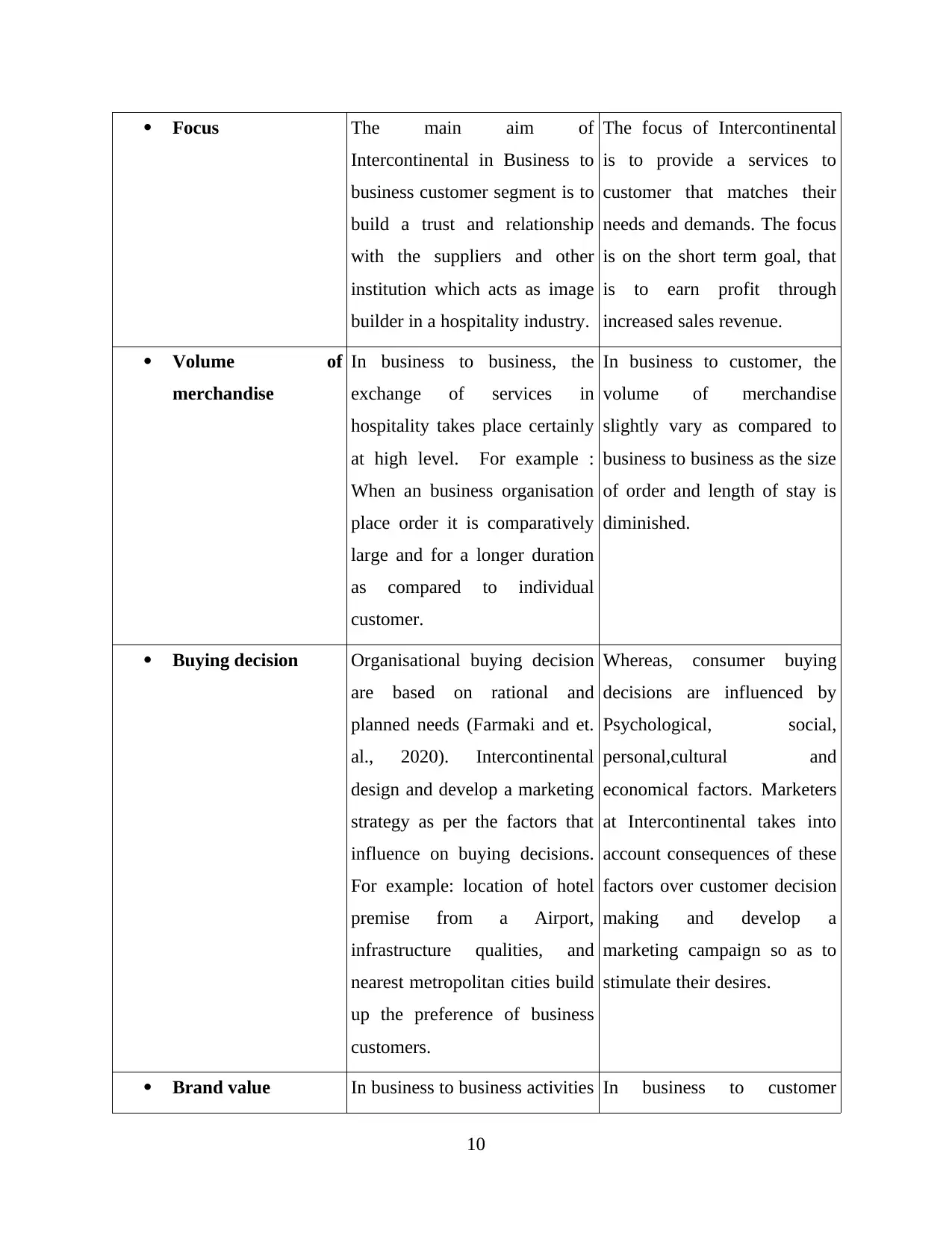
Focus The main aim of
Intercontinental in Business to
business customer segment is to
build a trust and relationship
with the suppliers and other
institution which acts as image
builder in a hospitality industry.
The focus of Intercontinental
is to provide a services to
customer that matches their
needs and demands. The focus
is on the short term goal, that
is to earn profit through
increased sales revenue.
Volume of
merchandise
In business to business, the
exchange of services in
hospitality takes place certainly
at high level. For example :
When an business organisation
place order it is comparatively
large and for a longer duration
as compared to individual
customer.
In business to customer, the
volume of merchandise
slightly vary as compared to
business to business as the size
of order and length of stay is
diminished.
Buying decision Organisational buying decision
are based on rational and
planned needs (Farmaki and et.
al., 2020). Intercontinental
design and develop a marketing
strategy as per the factors that
influence on buying decisions.
For example: location of hotel
premise from a Airport,
infrastructure qualities, and
nearest metropolitan cities build
up the preference of business
customers.
Whereas, consumer buying
decisions are influenced by
Psychological, social,
personal,cultural and
economical factors. Marketers
at Intercontinental takes into
account consequences of these
factors over customer decision
making and develop a
marketing campaign so as to
stimulate their desires.
Brand value In business to business activities In business to customer
10
Intercontinental in Business to
business customer segment is to
build a trust and relationship
with the suppliers and other
institution which acts as image
builder in a hospitality industry.
The focus of Intercontinental
is to provide a services to
customer that matches their
needs and demands. The focus
is on the short term goal, that
is to earn profit through
increased sales revenue.
Volume of
merchandise
In business to business, the
exchange of services in
hospitality takes place certainly
at high level. For example :
When an business organisation
place order it is comparatively
large and for a longer duration
as compared to individual
customer.
In business to customer, the
volume of merchandise
slightly vary as compared to
business to business as the size
of order and length of stay is
diminished.
Buying decision Organisational buying decision
are based on rational and
planned needs (Farmaki and et.
al., 2020). Intercontinental
design and develop a marketing
strategy as per the factors that
influence on buying decisions.
For example: location of hotel
premise from a Airport,
infrastructure qualities, and
nearest metropolitan cities build
up the preference of business
customers.
Whereas, consumer buying
decisions are influenced by
Psychological, social,
personal,cultural and
economical factors. Marketers
at Intercontinental takes into
account consequences of these
factors over customer decision
making and develop a
marketing campaign so as to
stimulate their desires.
Brand value In business to business activities In business to customer
10
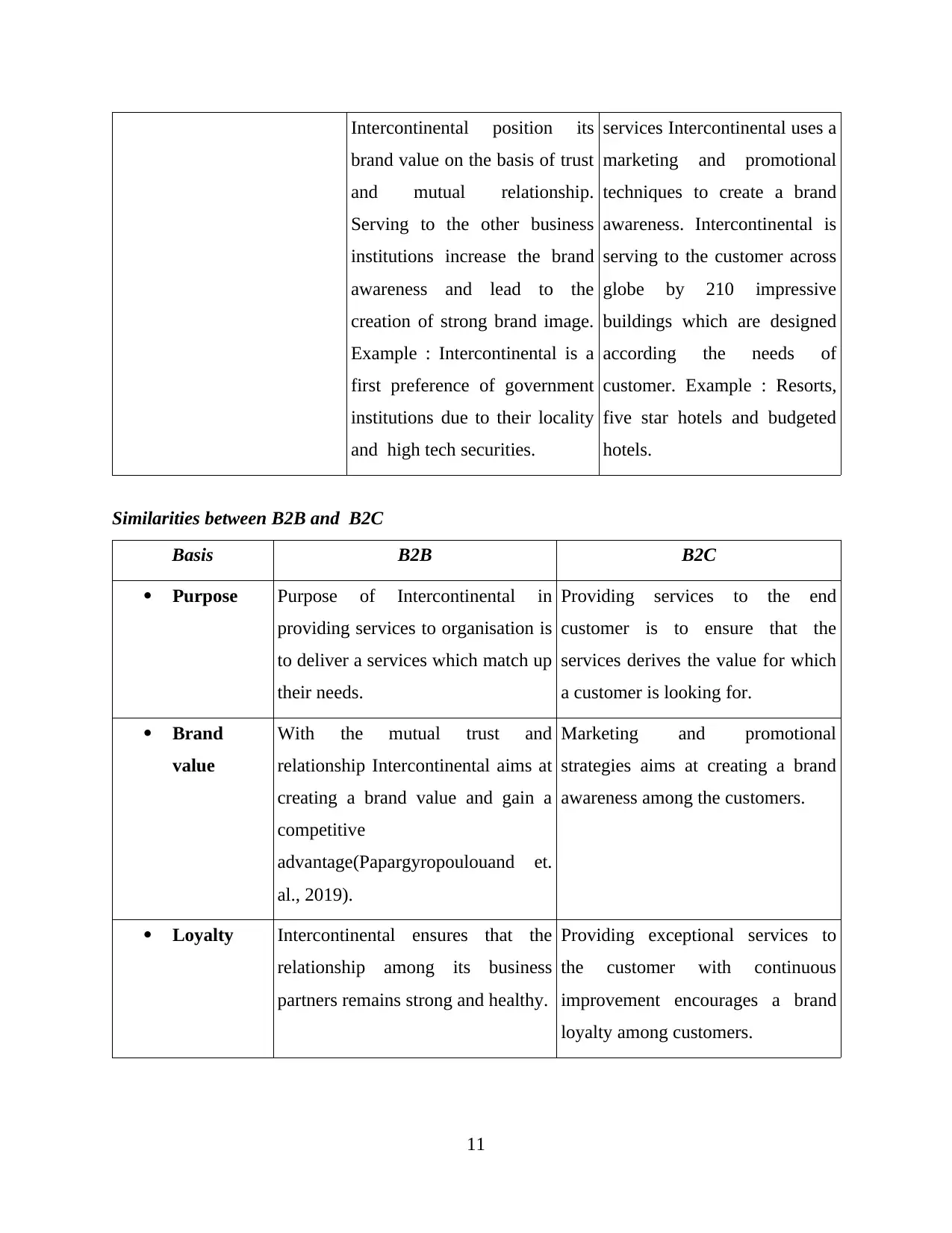
Intercontinental position its
brand value on the basis of trust
and mutual relationship.
Serving to the other business
institutions increase the brand
awareness and lead to the
creation of strong brand image.
Example : Intercontinental is a
first preference of government
institutions due to their locality
and high tech securities.
services Intercontinental uses a
marketing and promotional
techniques to create a brand
awareness. Intercontinental is
serving to the customer across
globe by 210 impressive
buildings which are designed
according the needs of
customer. Example : Resorts,
five star hotels and budgeted
hotels.
Similarities between B2B and B2C
Basis B2B B2C
Purpose Purpose of Intercontinental in
providing services to organisation is
to deliver a services which match up
their needs.
Providing services to the end
customer is to ensure that the
services derives the value for which
a customer is looking for.
Brand
value
With the mutual trust and
relationship Intercontinental aims at
creating a brand value and gain a
competitive
advantage(Papargyropoulouand et.
al., 2019).
Marketing and promotional
strategies aims at creating a brand
awareness among the customers.
Loyalty Intercontinental ensures that the
relationship among its business
partners remains strong and healthy.
Providing exceptional services to
the customer with continuous
improvement encourages a brand
loyalty among customers.
11
brand value on the basis of trust
and mutual relationship.
Serving to the other business
institutions increase the brand
awareness and lead to the
creation of strong brand image.
Example : Intercontinental is a
first preference of government
institutions due to their locality
and high tech securities.
services Intercontinental uses a
marketing and promotional
techniques to create a brand
awareness. Intercontinental is
serving to the customer across
globe by 210 impressive
buildings which are designed
according the needs of
customer. Example : Resorts,
five star hotels and budgeted
hotels.
Similarities between B2B and B2C
Basis B2B B2C
Purpose Purpose of Intercontinental in
providing services to organisation is
to deliver a services which match up
their needs.
Providing services to the end
customer is to ensure that the
services derives the value for which
a customer is looking for.
Brand
value
With the mutual trust and
relationship Intercontinental aims at
creating a brand value and gain a
competitive
advantage(Papargyropoulouand et.
al., 2019).
Marketing and promotional
strategies aims at creating a brand
awareness among the customers.
Loyalty Intercontinental ensures that the
relationship among its business
partners remains strong and healthy.
Providing exceptional services to
the customer with continuous
improvement encourages a brand
loyalty among customers.
11
Paraphrase This Document
Need a fresh take? Get an instant paraphrase of this document with our AI Paraphraser
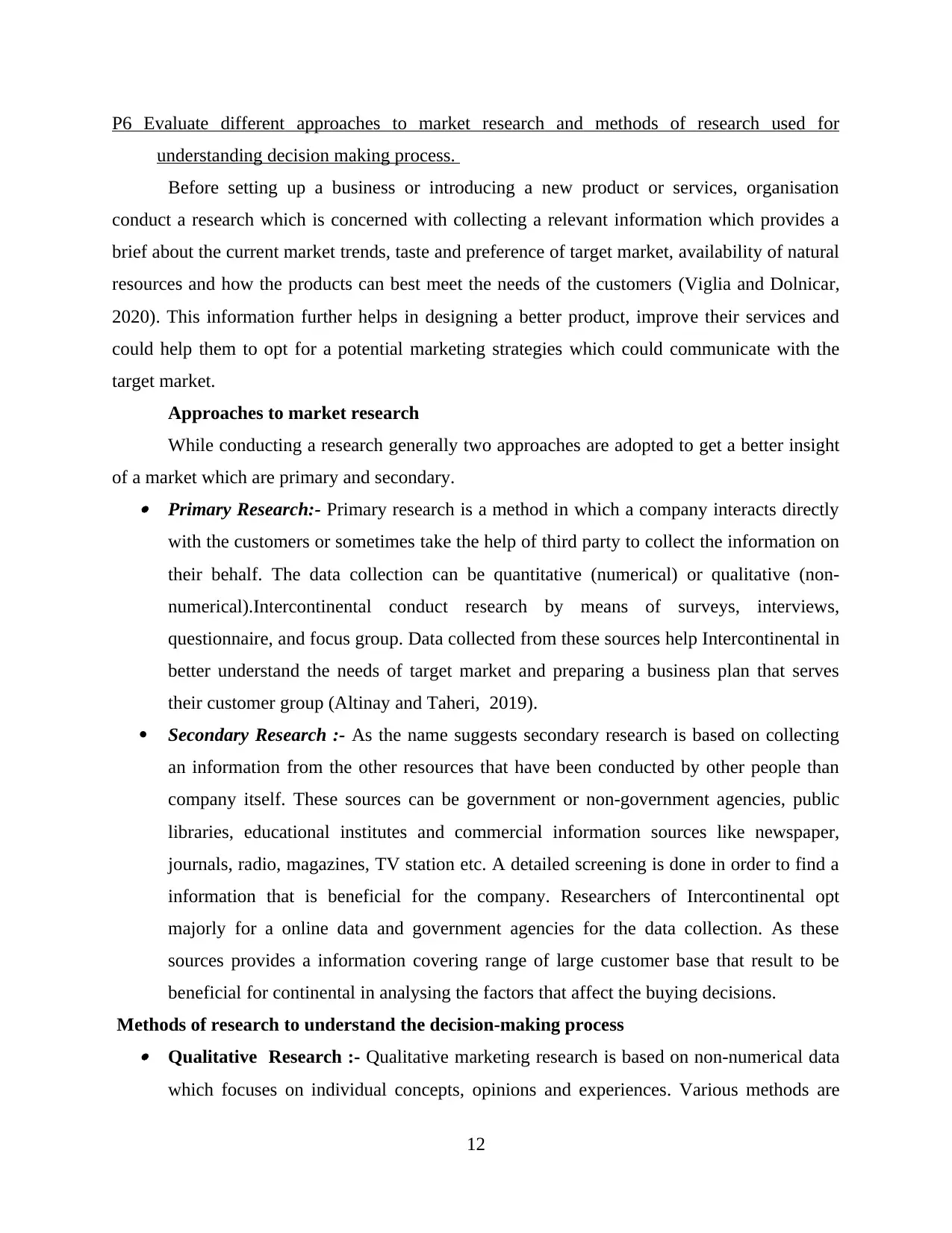
P6 Evaluate different approaches to market research and methods of research used for
understanding decision making process.
Before setting up a business or introducing a new product or services, organisation
conduct a research which is concerned with collecting a relevant information which provides a
brief about the current market trends, taste and preference of target market, availability of natural
resources and how the products can best meet the needs of the customers (Viglia and Dolnicar,
2020). This information further helps in designing a better product, improve their services and
could help them to opt for a potential marketing strategies which could communicate with the
target market.
Approaches to market research
While conducting a research generally two approaches are adopted to get a better insight
of a market which are primary and secondary. Primary Research:- Primary research is a method in which a company interacts directly
with the customers or sometimes take the help of third party to collect the information on
their behalf. The data collection can be quantitative (numerical) or qualitative (non-
numerical).Intercontinental conduct research by means of surveys, interviews,
questionnaire, and focus group. Data collected from these sources help Intercontinental in
better understand the needs of target market and preparing a business plan that serves
their customer group (Altinay and Taheri, 2019).
Secondary Research :- As the name suggests secondary research is based on collecting
an information from the other resources that have been conducted by other people than
company itself. These sources can be government or non-government agencies, public
libraries, educational institutes and commercial information sources like newspaper,
journals, radio, magazines, TV station etc. A detailed screening is done in order to find a
information that is beneficial for the company. Researchers of Intercontinental opt
majorly for a online data and government agencies for the data collection. As these
sources provides a information covering range of large customer base that result to be
beneficial for continental in analysing the factors that affect the buying decisions.
Methods of research to understand the decision-making process Qualitative Research :- Qualitative marketing research is based on non-numerical data
which focuses on individual concepts, opinions and experiences. Various methods are
12
understanding decision making process.
Before setting up a business or introducing a new product or services, organisation
conduct a research which is concerned with collecting a relevant information which provides a
brief about the current market trends, taste and preference of target market, availability of natural
resources and how the products can best meet the needs of the customers (Viglia and Dolnicar,
2020). This information further helps in designing a better product, improve their services and
could help them to opt for a potential marketing strategies which could communicate with the
target market.
Approaches to market research
While conducting a research generally two approaches are adopted to get a better insight
of a market which are primary and secondary. Primary Research:- Primary research is a method in which a company interacts directly
with the customers or sometimes take the help of third party to collect the information on
their behalf. The data collection can be quantitative (numerical) or qualitative (non-
numerical).Intercontinental conduct research by means of surveys, interviews,
questionnaire, and focus group. Data collected from these sources help Intercontinental in
better understand the needs of target market and preparing a business plan that serves
their customer group (Altinay and Taheri, 2019).
Secondary Research :- As the name suggests secondary research is based on collecting
an information from the other resources that have been conducted by other people than
company itself. These sources can be government or non-government agencies, public
libraries, educational institutes and commercial information sources like newspaper,
journals, radio, magazines, TV station etc. A detailed screening is done in order to find a
information that is beneficial for the company. Researchers of Intercontinental opt
majorly for a online data and government agencies for the data collection. As these
sources provides a information covering range of large customer base that result to be
beneficial for continental in analysing the factors that affect the buying decisions.
Methods of research to understand the decision-making process Qualitative Research :- Qualitative marketing research is based on non-numerical data
which focuses on individual concepts, opinions and experiences. Various methods are
12
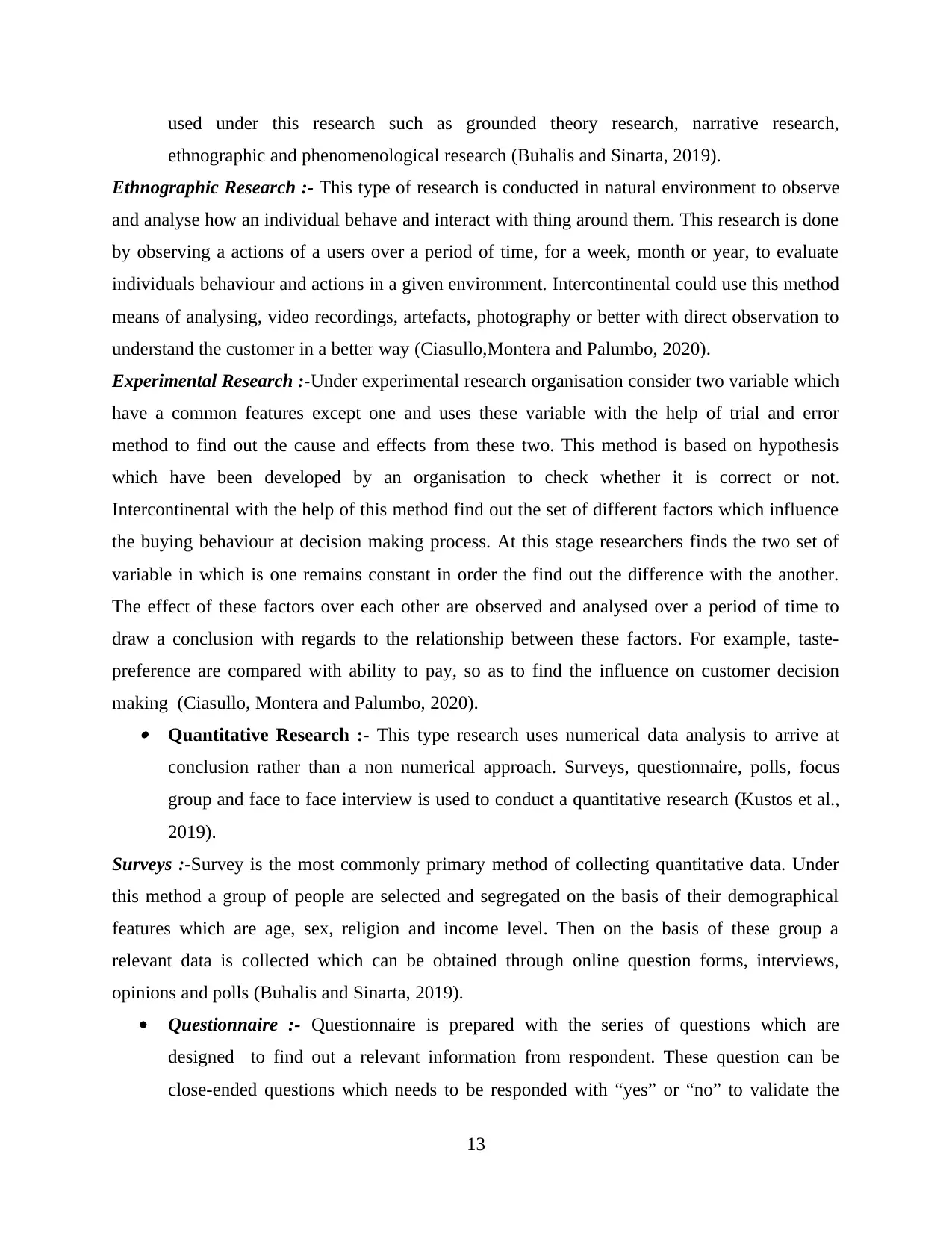
used under this research such as grounded theory research, narrative research,
ethnographic and phenomenological research (Buhalis and Sinarta, 2019).
Ethnographic Research :- This type of research is conducted in natural environment to observe
and analyse how an individual behave and interact with thing around them. This research is done
by observing a actions of a users over a period of time, for a week, month or year, to evaluate
individuals behaviour and actions in a given environment. Intercontinental could use this method
means of analysing, video recordings, artefacts, photography or better with direct observation to
understand the customer in a better way (Ciasullo,Montera and Palumbo, 2020).
Experimental Research :-Under experimental research organisation consider two variable which
have a common features except one and uses these variable with the help of trial and error
method to find out the cause and effects from these two. This method is based on hypothesis
which have been developed by an organisation to check whether it is correct or not.
Intercontinental with the help of this method find out the set of different factors which influence
the buying behaviour at decision making process. At this stage researchers finds the two set of
variable in which is one remains constant in order the find out the difference with the another.
The effect of these factors over each other are observed and analysed over a period of time to
draw a conclusion with regards to the relationship between these factors. For example, taste-
preference are compared with ability to pay, so as to find the influence on customer decision
making (Ciasullo, Montera and Palumbo, 2020). Quantitative Research :- This type research uses numerical data analysis to arrive at
conclusion rather than a non numerical approach. Surveys, questionnaire, polls, focus
group and face to face interview is used to conduct a quantitative research (Kustos et al.,
2019).
Surveys :-Survey is the most commonly primary method of collecting quantitative data. Under
this method a group of people are selected and segregated on the basis of their demographical
features which are age, sex, religion and income level. Then on the basis of these group a
relevant data is collected which can be obtained through online question forms, interviews,
opinions and polls (Buhalis and Sinarta, 2019).
Questionnaire :- Questionnaire is prepared with the series of questions which are
designed to find out a relevant information from respondent. These question can be
close-ended questions which needs to be responded with “yes” or “no” to validate the
13
ethnographic and phenomenological research (Buhalis and Sinarta, 2019).
Ethnographic Research :- This type of research is conducted in natural environment to observe
and analyse how an individual behave and interact with thing around them. This research is done
by observing a actions of a users over a period of time, for a week, month or year, to evaluate
individuals behaviour and actions in a given environment. Intercontinental could use this method
means of analysing, video recordings, artefacts, photography or better with direct observation to
understand the customer in a better way (Ciasullo,Montera and Palumbo, 2020).
Experimental Research :-Under experimental research organisation consider two variable which
have a common features except one and uses these variable with the help of trial and error
method to find out the cause and effects from these two. This method is based on hypothesis
which have been developed by an organisation to check whether it is correct or not.
Intercontinental with the help of this method find out the set of different factors which influence
the buying behaviour at decision making process. At this stage researchers finds the two set of
variable in which is one remains constant in order the find out the difference with the another.
The effect of these factors over each other are observed and analysed over a period of time to
draw a conclusion with regards to the relationship between these factors. For example, taste-
preference are compared with ability to pay, so as to find the influence on customer decision
making (Ciasullo, Montera and Palumbo, 2020). Quantitative Research :- This type research uses numerical data analysis to arrive at
conclusion rather than a non numerical approach. Surveys, questionnaire, polls, focus
group and face to face interview is used to conduct a quantitative research (Kustos et al.,
2019).
Surveys :-Survey is the most commonly primary method of collecting quantitative data. Under
this method a group of people are selected and segregated on the basis of their demographical
features which are age, sex, religion and income level. Then on the basis of these group a
relevant data is collected which can be obtained through online question forms, interviews,
opinions and polls (Buhalis and Sinarta, 2019).
Questionnaire :- Questionnaire is prepared with the series of questions which are
designed to find out a relevant information from respondent. These question can be
close-ended questions which needs to be responded with “yes” or “no” to validate the
13
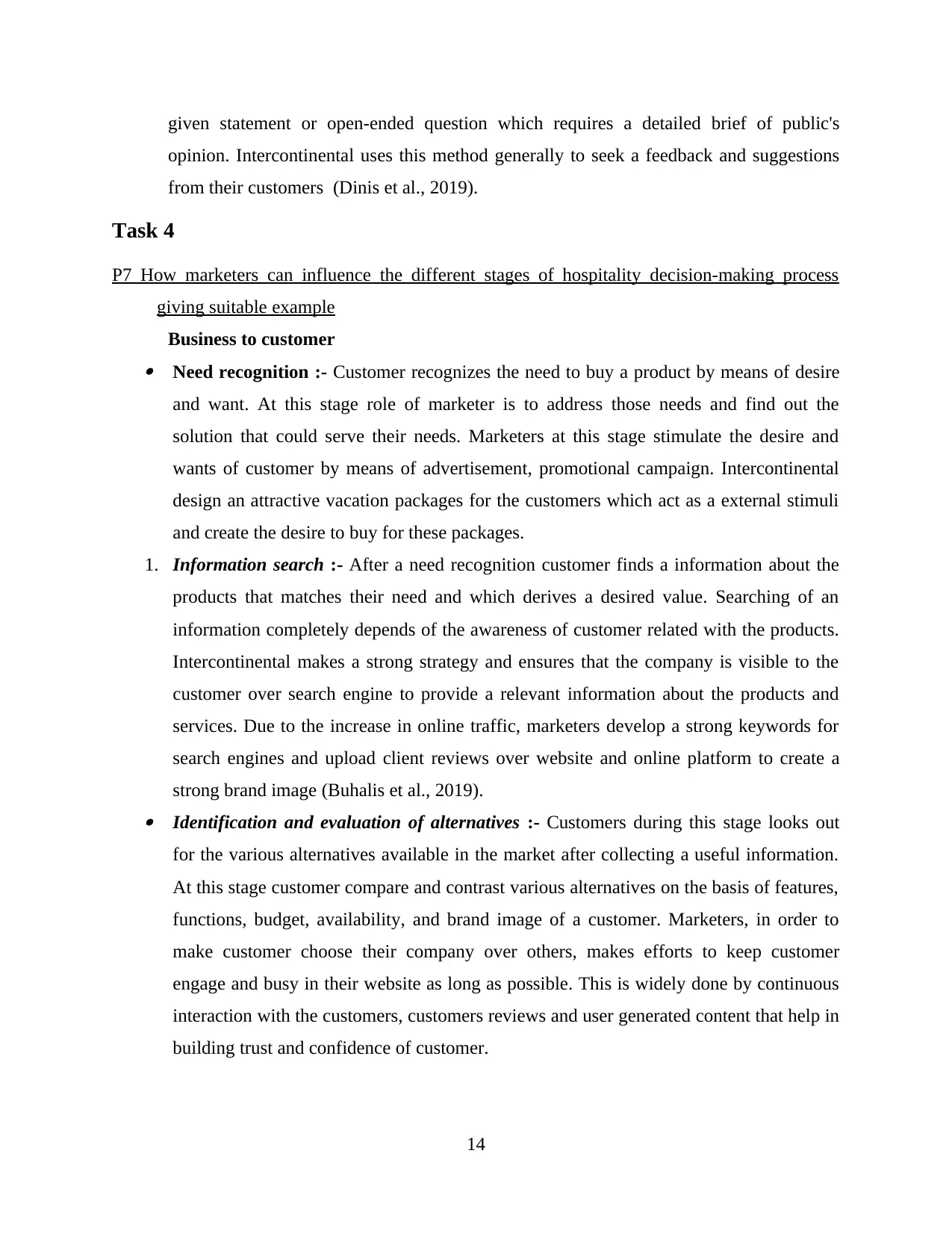
given statement or open-ended question which requires a detailed brief of public's
opinion. Intercontinental uses this method generally to seek a feedback and suggestions
from their customers (Dinis et al., 2019).
Task 4
P7 How marketers can influence the different stages of hospitality decision-making process
giving suitable example
Business to customer Need recognition :- Customer recognizes the need to buy a product by means of desire
and want. At this stage role of marketer is to address those needs and find out the
solution that could serve their needs. Marketers at this stage stimulate the desire and
wants of customer by means of advertisement, promotional campaign. Intercontinental
design an attractive vacation packages for the customers which act as a external stimuli
and create the desire to buy for these packages.
1. Information search :- After a need recognition customer finds a information about the
products that matches their need and which derives a desired value. Searching of an
information completely depends of the awareness of customer related with the products.
Intercontinental makes a strong strategy and ensures that the company is visible to the
customer over search engine to provide a relevant information about the products and
services. Due to the increase in online traffic, marketers develop a strong keywords for
search engines and upload client reviews over website and online platform to create a
strong brand image (Buhalis et al., 2019). Identification and evaluation of alternatives :- Customers during this stage looks out
for the various alternatives available in the market after collecting a useful information.
At this stage customer compare and contrast various alternatives on the basis of features,
functions, budget, availability, and brand image of a customer. Marketers, in order to
make customer choose their company over others, makes efforts to keep customer
engage and busy in their website as long as possible. This is widely done by continuous
interaction with the customers, customers reviews and user generated content that help in
building trust and confidence of customer.
14
opinion. Intercontinental uses this method generally to seek a feedback and suggestions
from their customers (Dinis et al., 2019).
Task 4
P7 How marketers can influence the different stages of hospitality decision-making process
giving suitable example
Business to customer Need recognition :- Customer recognizes the need to buy a product by means of desire
and want. At this stage role of marketer is to address those needs and find out the
solution that could serve their needs. Marketers at this stage stimulate the desire and
wants of customer by means of advertisement, promotional campaign. Intercontinental
design an attractive vacation packages for the customers which act as a external stimuli
and create the desire to buy for these packages.
1. Information search :- After a need recognition customer finds a information about the
products that matches their need and which derives a desired value. Searching of an
information completely depends of the awareness of customer related with the products.
Intercontinental makes a strong strategy and ensures that the company is visible to the
customer over search engine to provide a relevant information about the products and
services. Due to the increase in online traffic, marketers develop a strong keywords for
search engines and upload client reviews over website and online platform to create a
strong brand image (Buhalis et al., 2019). Identification and evaluation of alternatives :- Customers during this stage looks out
for the various alternatives available in the market after collecting a useful information.
At this stage customer compare and contrast various alternatives on the basis of features,
functions, budget, availability, and brand image of a customer. Marketers, in order to
make customer choose their company over others, makes efforts to keep customer
engage and busy in their website as long as possible. This is widely done by continuous
interaction with the customers, customers reviews and user generated content that help in
building trust and confidence of customer.
14
Secure Best Marks with AI Grader
Need help grading? Try our AI Grader for instant feedback on your assignments.
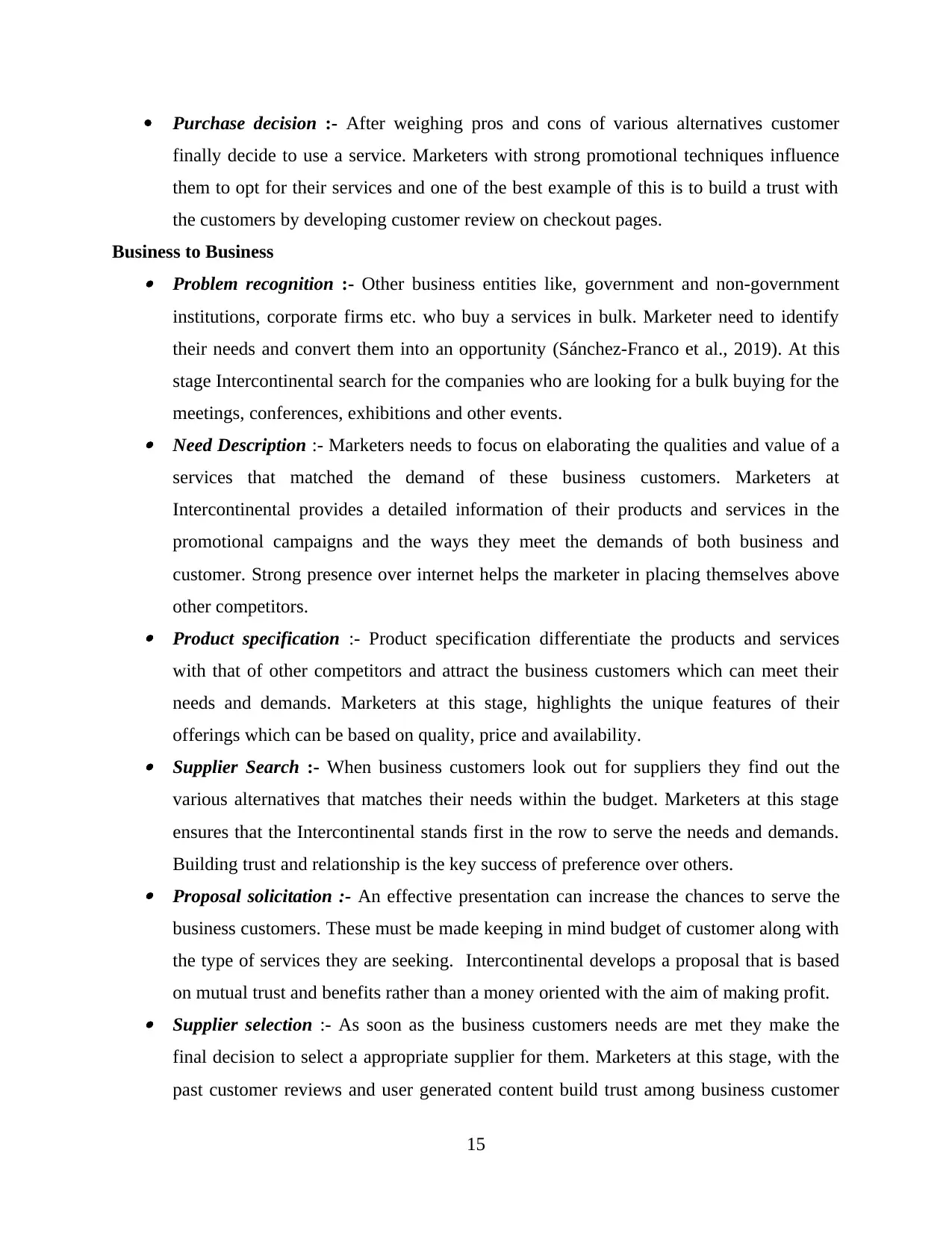
Purchase decision :- After weighing pros and cons of various alternatives customer
finally decide to use a service. Marketers with strong promotional techniques influence
them to opt for their services and one of the best example of this is to build a trust with
the customers by developing customer review on checkout pages.
Business to Business Problem recognition :- Other business entities like, government and non-government
institutions, corporate firms etc. who buy a services in bulk. Marketer need to identify
their needs and convert them into an opportunity (Sánchez-Franco et al., 2019). At this
stage Intercontinental search for the companies who are looking for a bulk buying for the
meetings, conferences, exhibitions and other events. Need Description :- Marketers needs to focus on elaborating the qualities and value of a
services that matched the demand of these business customers. Marketers at
Intercontinental provides a detailed information of their products and services in the
promotional campaigns and the ways they meet the demands of both business and
customer. Strong presence over internet helps the marketer in placing themselves above
other competitors. Product specification :- Product specification differentiate the products and services
with that of other competitors and attract the business customers which can meet their
needs and demands. Marketers at this stage, highlights the unique features of their
offerings which can be based on quality, price and availability. Supplier Search :- When business customers look out for suppliers they find out the
various alternatives that matches their needs within the budget. Marketers at this stage
ensures that the Intercontinental stands first in the row to serve the needs and demands.
Building trust and relationship is the key success of preference over others. Proposal solicitation :- An effective presentation can increase the chances to serve the
business customers. These must be made keeping in mind budget of customer along with
the type of services they are seeking. Intercontinental develops a proposal that is based
on mutual trust and benefits rather than a money oriented with the aim of making profit. Supplier selection :- As soon as the business customers needs are met they make the
final decision to select a appropriate supplier for them. Marketers at this stage, with the
past customer reviews and user generated content build trust among business customer
15
finally decide to use a service. Marketers with strong promotional techniques influence
them to opt for their services and one of the best example of this is to build a trust with
the customers by developing customer review on checkout pages.
Business to Business Problem recognition :- Other business entities like, government and non-government
institutions, corporate firms etc. who buy a services in bulk. Marketer need to identify
their needs and convert them into an opportunity (Sánchez-Franco et al., 2019). At this
stage Intercontinental search for the companies who are looking for a bulk buying for the
meetings, conferences, exhibitions and other events. Need Description :- Marketers needs to focus on elaborating the qualities and value of a
services that matched the demand of these business customers. Marketers at
Intercontinental provides a detailed information of their products and services in the
promotional campaigns and the ways they meet the demands of both business and
customer. Strong presence over internet helps the marketer in placing themselves above
other competitors. Product specification :- Product specification differentiate the products and services
with that of other competitors and attract the business customers which can meet their
needs and demands. Marketers at this stage, highlights the unique features of their
offerings which can be based on quality, price and availability. Supplier Search :- When business customers look out for suppliers they find out the
various alternatives that matches their needs within the budget. Marketers at this stage
ensures that the Intercontinental stands first in the row to serve the needs and demands.
Building trust and relationship is the key success of preference over others. Proposal solicitation :- An effective presentation can increase the chances to serve the
business customers. These must be made keeping in mind budget of customer along with
the type of services they are seeking. Intercontinental develops a proposal that is based
on mutual trust and benefits rather than a money oriented with the aim of making profit. Supplier selection :- As soon as the business customers needs are met they make the
final decision to select a appropriate supplier for them. Marketers at this stage, with the
past customer reviews and user generated content build trust among business customer
15
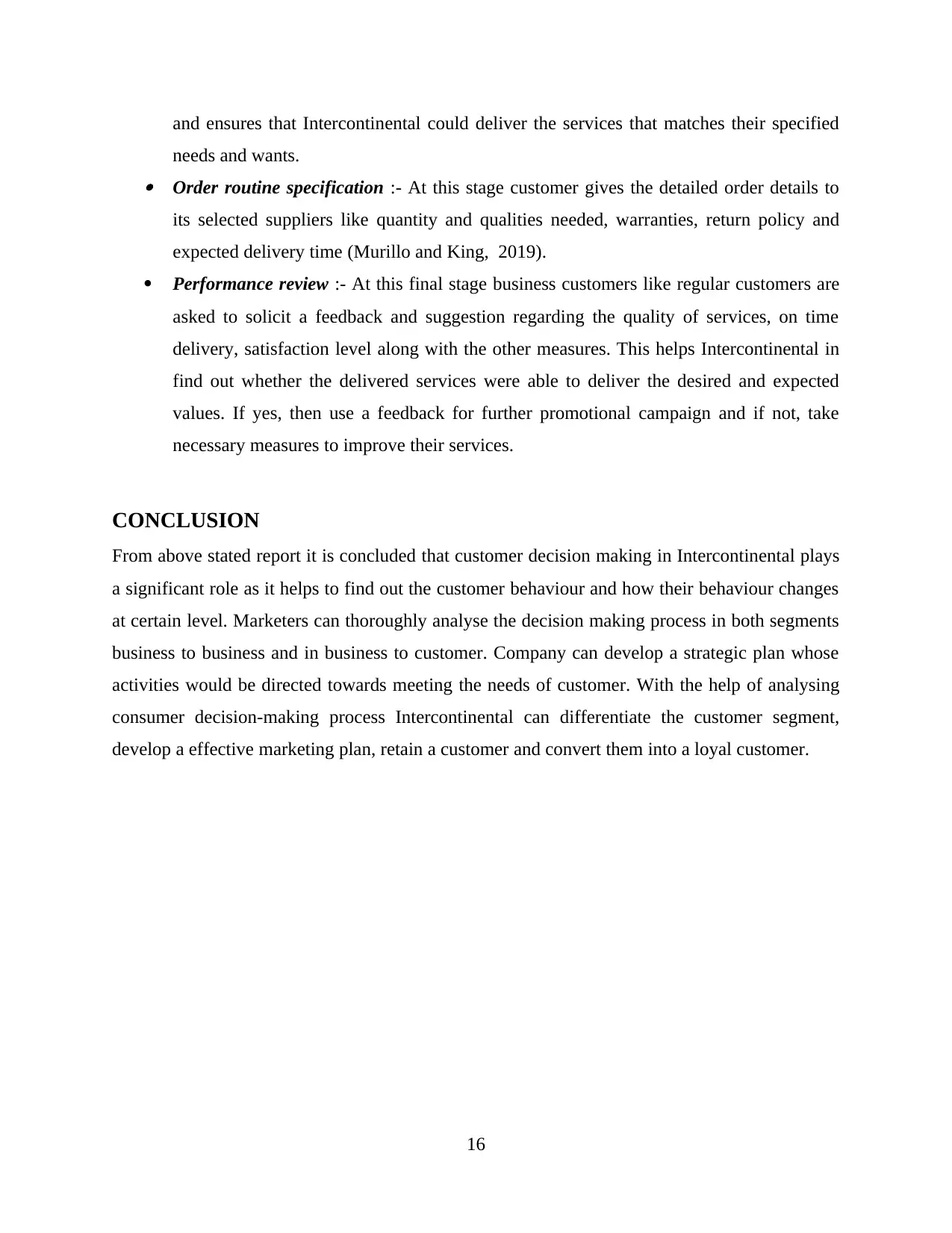
and ensures that Intercontinental could deliver the services that matches their specified
needs and wants. Order routine specification :- At this stage customer gives the detailed order details to
its selected suppliers like quantity and qualities needed, warranties, return policy and
expected delivery time (Murillo and King, 2019).
Performance review :- At this final stage business customers like regular customers are
asked to solicit a feedback and suggestion regarding the quality of services, on time
delivery, satisfaction level along with the other measures. This helps Intercontinental in
find out whether the delivered services were able to deliver the desired and expected
values. If yes, then use a feedback for further promotional campaign and if not, take
necessary measures to improve their services.
CONCLUSION
From above stated report it is concluded that customer decision making in Intercontinental plays
a significant role as it helps to find out the customer behaviour and how their behaviour changes
at certain level. Marketers can thoroughly analyse the decision making process in both segments
business to business and in business to customer. Company can develop a strategic plan whose
activities would be directed towards meeting the needs of customer. With the help of analysing
consumer decision-making process Intercontinental can differentiate the customer segment,
develop a effective marketing plan, retain a customer and convert them into a loyal customer.
16
needs and wants. Order routine specification :- At this stage customer gives the detailed order details to
its selected suppliers like quantity and qualities needed, warranties, return policy and
expected delivery time (Murillo and King, 2019).
Performance review :- At this final stage business customers like regular customers are
asked to solicit a feedback and suggestion regarding the quality of services, on time
delivery, satisfaction level along with the other measures. This helps Intercontinental in
find out whether the delivered services were able to deliver the desired and expected
values. If yes, then use a feedback for further promotional campaign and if not, take
necessary measures to improve their services.
CONCLUSION
From above stated report it is concluded that customer decision making in Intercontinental plays
a significant role as it helps to find out the customer behaviour and how their behaviour changes
at certain level. Marketers can thoroughly analyse the decision making process in both segments
business to business and in business to customer. Company can develop a strategic plan whose
activities would be directed towards meeting the needs of customer. With the help of analysing
consumer decision-making process Intercontinental can differentiate the customer segment,
develop a effective marketing plan, retain a customer and convert them into a loyal customer.
16
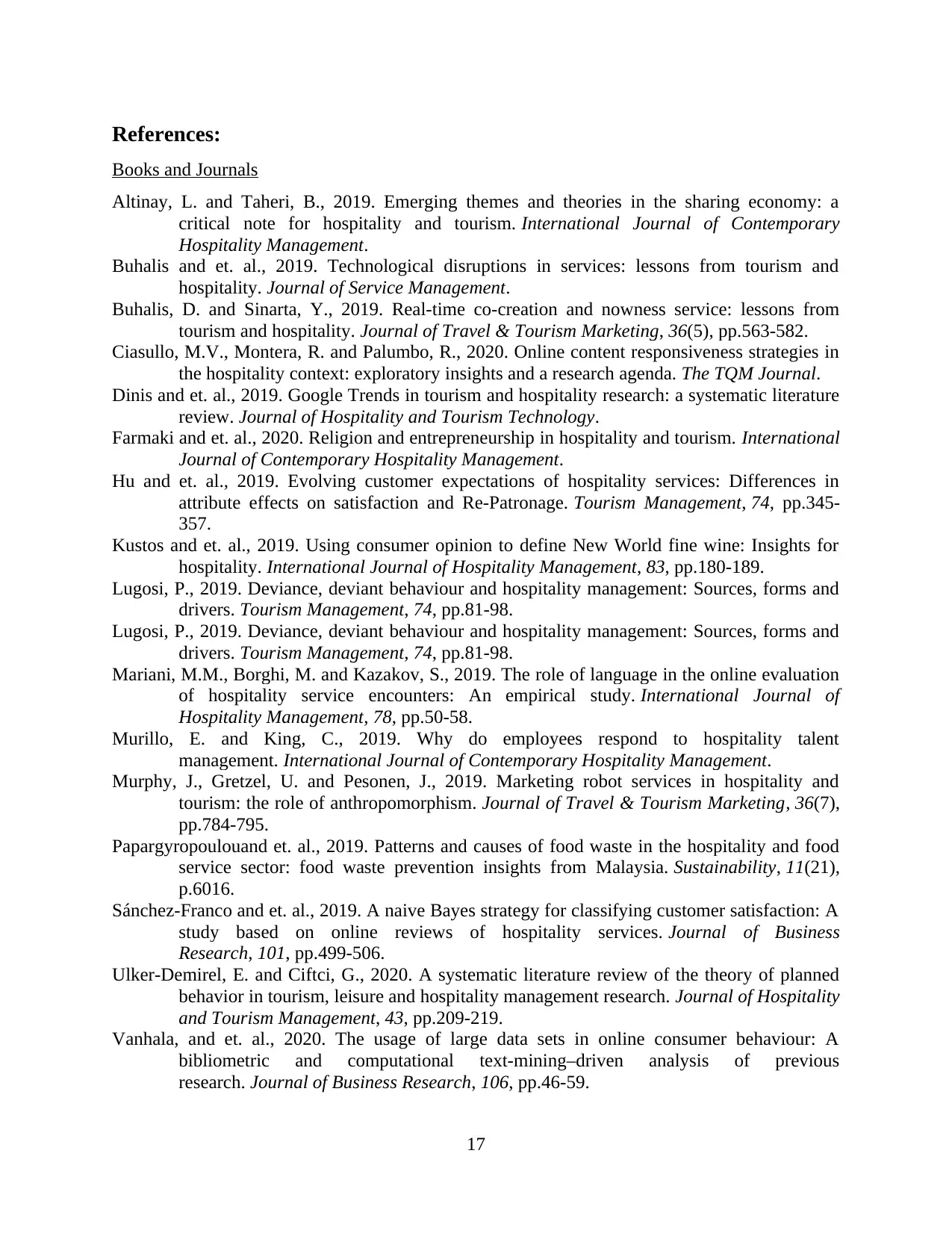
References:
Books and Journals
Altinay, L. and Taheri, B., 2019. Emerging themes and theories in the sharing economy: a
critical note for hospitality and tourism. International Journal of Contemporary
Hospitality Management.
Buhalis and et. al., 2019. Technological disruptions in services: lessons from tourism and
hospitality. Journal of Service Management.
Buhalis, D. and Sinarta, Y., 2019. Real-time co-creation and nowness service: lessons from
tourism and hospitality. Journal of Travel & Tourism Marketing, 36(5), pp.563-582.
Ciasullo, M.V., Montera, R. and Palumbo, R., 2020. Online content responsiveness strategies in
the hospitality context: exploratory insights and a research agenda. The TQM Journal.
Dinis and et. al., 2019. Google Trends in tourism and hospitality research: a systematic literature
review. Journal of Hospitality and Tourism Technology.
Farmaki and et. al., 2020. Religion and entrepreneurship in hospitality and tourism. International
Journal of Contemporary Hospitality Management.
Hu and et. al., 2019. Evolving customer expectations of hospitality services: Differences in
attribute effects on satisfaction and Re-Patronage. Tourism Management, 74, pp.345-
357.
Kustos and et. al., 2019. Using consumer opinion to define New World fine wine: Insights for
hospitality. International Journal of Hospitality Management, 83, pp.180-189.
Lugosi, P., 2019. Deviance, deviant behaviour and hospitality management: Sources, forms and
drivers. Tourism Management, 74, pp.81-98.
Lugosi, P., 2019. Deviance, deviant behaviour and hospitality management: Sources, forms and
drivers. Tourism Management, 74, pp.81-98.
Mariani, M.M., Borghi, M. and Kazakov, S., 2019. The role of language in the online evaluation
of hospitality service encounters: An empirical study. International Journal of
Hospitality Management, 78, pp.50-58.
Murillo, E. and King, C., 2019. Why do employees respond to hospitality talent
management. International Journal of Contemporary Hospitality Management.
Murphy, J., Gretzel, U. and Pesonen, J., 2019. Marketing robot services in hospitality and
tourism: the role of anthropomorphism. Journal of Travel & Tourism Marketing, 36(7),
pp.784-795.
Papargyropoulouand et. al., 2019. Patterns and causes of food waste in the hospitality and food
service sector: food waste prevention insights from Malaysia. Sustainability, 11(21),
p.6016.
Sánchez-Franco and et. al., 2019. A naive Bayes strategy for classifying customer satisfaction: A
study based on online reviews of hospitality services. Journal of Business
Research, 101, pp.499-506.
Ulker-Demirel, E. and Ciftci, G., 2020. A systematic literature review of the theory of planned
behavior in tourism, leisure and hospitality management research. Journal of Hospitality
and Tourism Management, 43, pp.209-219.
Vanhala, and et. al., 2020. The usage of large data sets in online consumer behaviour: A
bibliometric and computational text-mining–driven analysis of previous
research. Journal of Business Research, 106, pp.46-59.
17
Books and Journals
Altinay, L. and Taheri, B., 2019. Emerging themes and theories in the sharing economy: a
critical note for hospitality and tourism. International Journal of Contemporary
Hospitality Management.
Buhalis and et. al., 2019. Technological disruptions in services: lessons from tourism and
hospitality. Journal of Service Management.
Buhalis, D. and Sinarta, Y., 2019. Real-time co-creation and nowness service: lessons from
tourism and hospitality. Journal of Travel & Tourism Marketing, 36(5), pp.563-582.
Ciasullo, M.V., Montera, R. and Palumbo, R., 2020. Online content responsiveness strategies in
the hospitality context: exploratory insights and a research agenda. The TQM Journal.
Dinis and et. al., 2019. Google Trends in tourism and hospitality research: a systematic literature
review. Journal of Hospitality and Tourism Technology.
Farmaki and et. al., 2020. Religion and entrepreneurship in hospitality and tourism. International
Journal of Contemporary Hospitality Management.
Hu and et. al., 2019. Evolving customer expectations of hospitality services: Differences in
attribute effects on satisfaction and Re-Patronage. Tourism Management, 74, pp.345-
357.
Kustos and et. al., 2019. Using consumer opinion to define New World fine wine: Insights for
hospitality. International Journal of Hospitality Management, 83, pp.180-189.
Lugosi, P., 2019. Deviance, deviant behaviour and hospitality management: Sources, forms and
drivers. Tourism Management, 74, pp.81-98.
Lugosi, P., 2019. Deviance, deviant behaviour and hospitality management: Sources, forms and
drivers. Tourism Management, 74, pp.81-98.
Mariani, M.M., Borghi, M. and Kazakov, S., 2019. The role of language in the online evaluation
of hospitality service encounters: An empirical study. International Journal of
Hospitality Management, 78, pp.50-58.
Murillo, E. and King, C., 2019. Why do employees respond to hospitality talent
management. International Journal of Contemporary Hospitality Management.
Murphy, J., Gretzel, U. and Pesonen, J., 2019. Marketing robot services in hospitality and
tourism: the role of anthropomorphism. Journal of Travel & Tourism Marketing, 36(7),
pp.784-795.
Papargyropoulouand et. al., 2019. Patterns and causes of food waste in the hospitality and food
service sector: food waste prevention insights from Malaysia. Sustainability, 11(21),
p.6016.
Sánchez-Franco and et. al., 2019. A naive Bayes strategy for classifying customer satisfaction: A
study based on online reviews of hospitality services. Journal of Business
Research, 101, pp.499-506.
Ulker-Demirel, E. and Ciftci, G., 2020. A systematic literature review of the theory of planned
behavior in tourism, leisure and hospitality management research. Journal of Hospitality
and Tourism Management, 43, pp.209-219.
Vanhala, and et. al., 2020. The usage of large data sets in online consumer behaviour: A
bibliometric and computational text-mining–driven analysis of previous
research. Journal of Business Research, 106, pp.46-59.
17
Paraphrase This Document
Need a fresh take? Get an instant paraphrase of this document with our AI Paraphraser
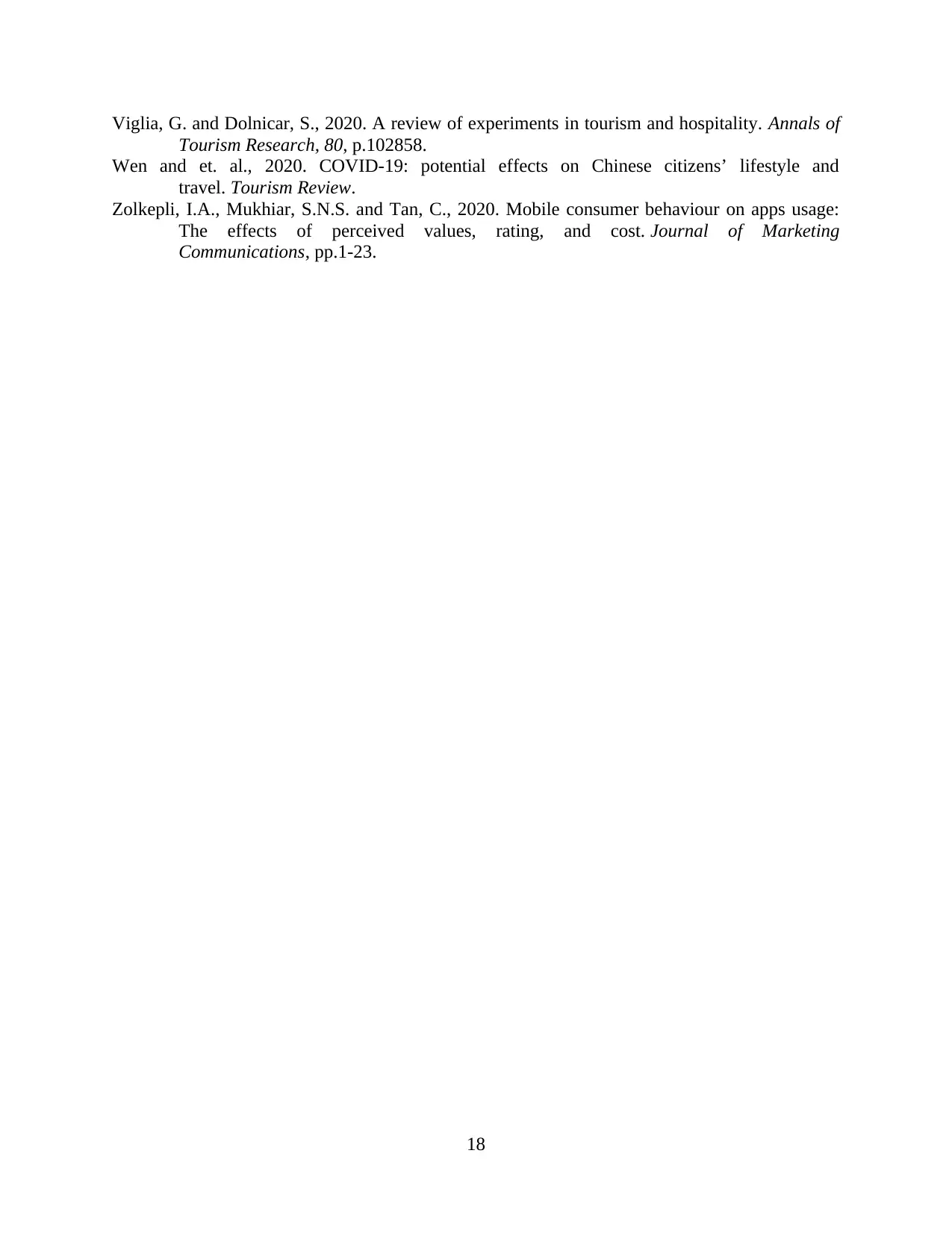
Viglia, G. and Dolnicar, S., 2020. A review of experiments in tourism and hospitality. Annals of
Tourism Research, 80, p.102858.
Wen and et. al., 2020. COVID-19: potential effects on Chinese citizens’ lifestyle and
travel. Tourism Review.
Zolkepli, I.A., Mukhiar, S.N.S. and Tan, C., 2020. Mobile consumer behaviour on apps usage:
The effects of perceived values, rating, and cost. Journal of Marketing
Communications, pp.1-23.
18
Tourism Research, 80, p.102858.
Wen and et. al., 2020. COVID-19: potential effects on Chinese citizens’ lifestyle and
travel. Tourism Review.
Zolkepli, I.A., Mukhiar, S.N.S. and Tan, C., 2020. Mobile consumer behaviour on apps usage:
The effects of perceived values, rating, and cost. Journal of Marketing
Communications, pp.1-23.
18
1 out of 20
Related Documents
Your All-in-One AI-Powered Toolkit for Academic Success.
+13062052269
info@desklib.com
Available 24*7 on WhatsApp / Email
![[object Object]](/_next/static/media/star-bottom.7253800d.svg)
Unlock your academic potential
© 2024 | Zucol Services PVT LTD | All rights reserved.


